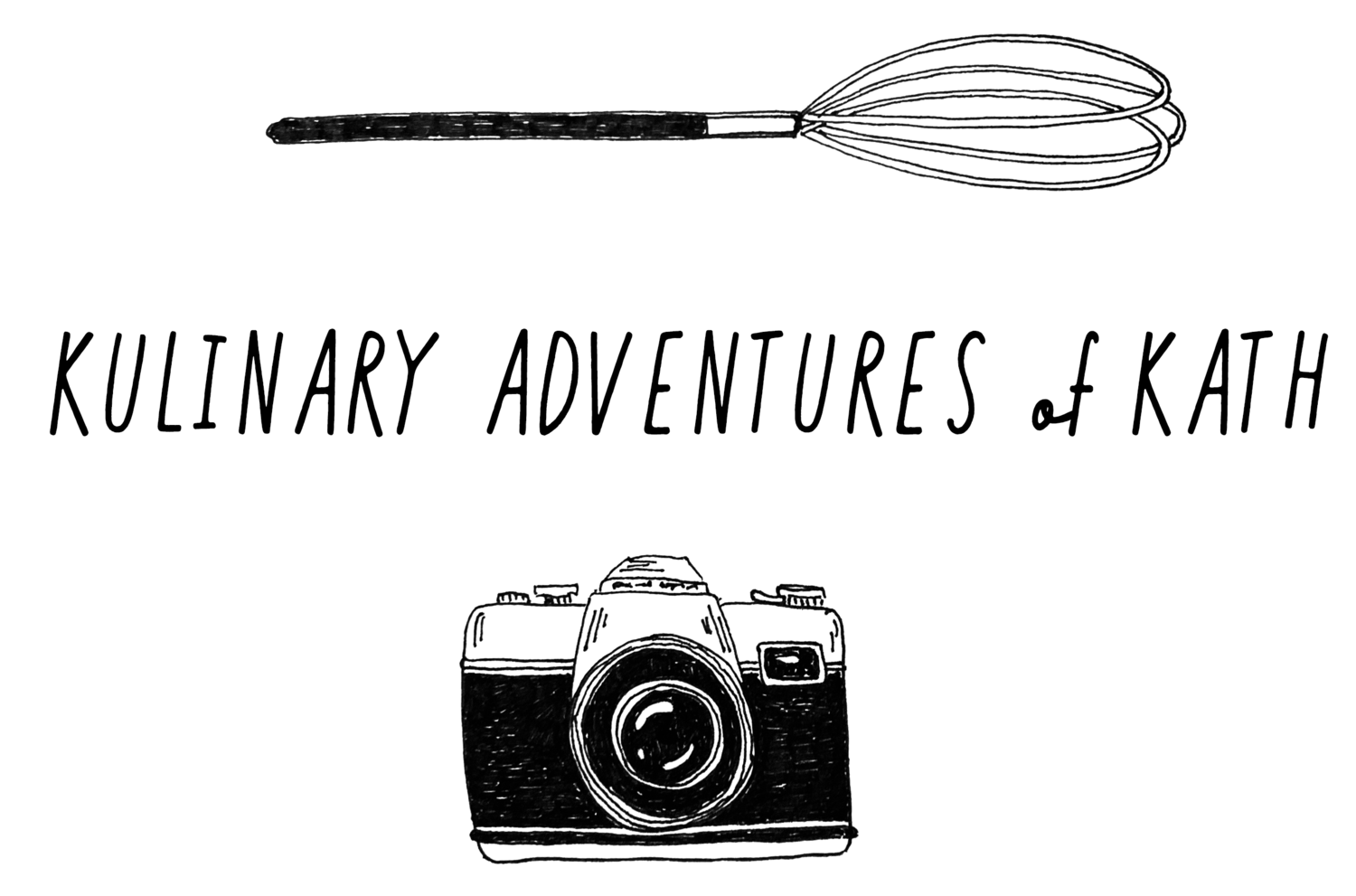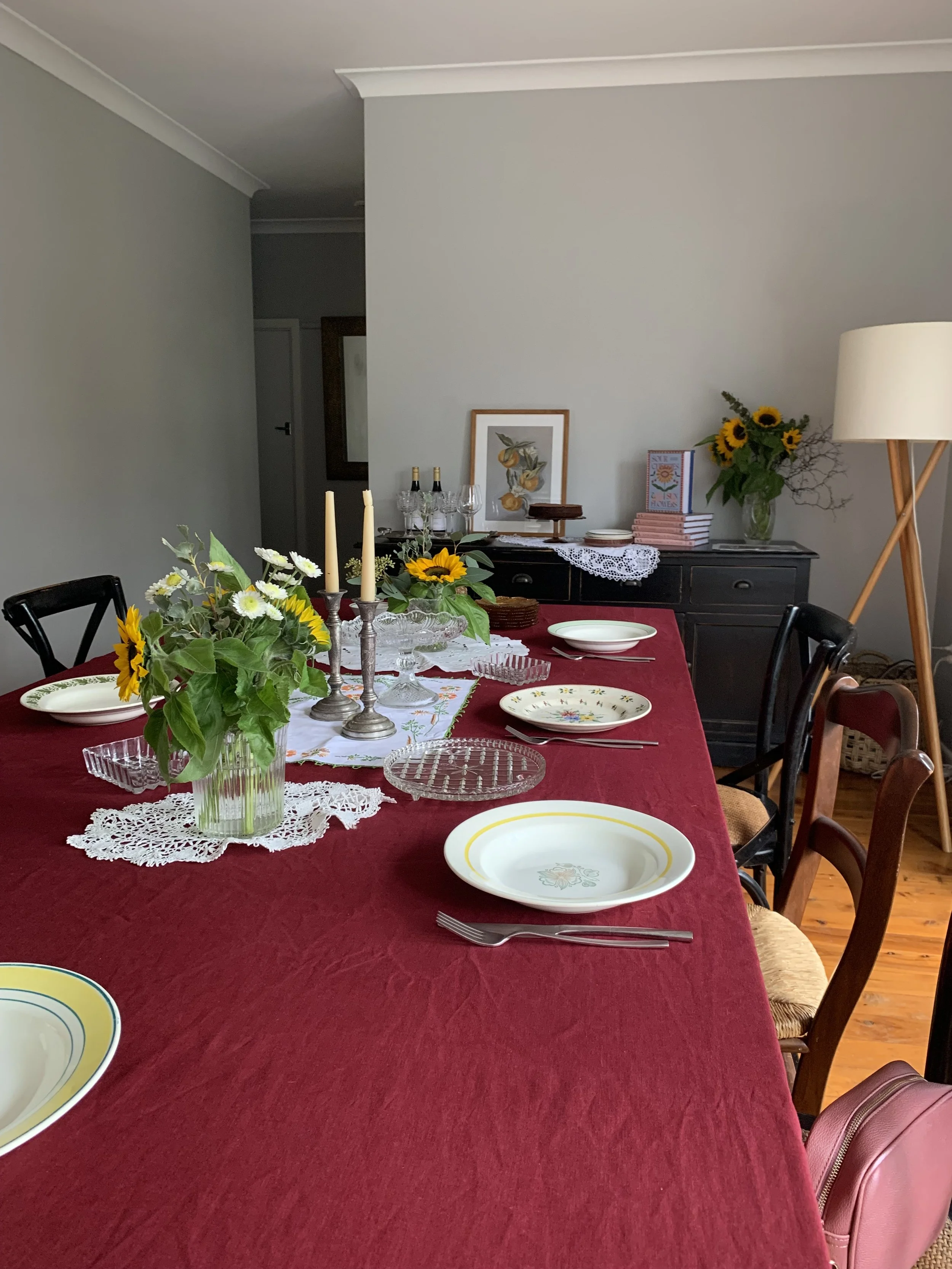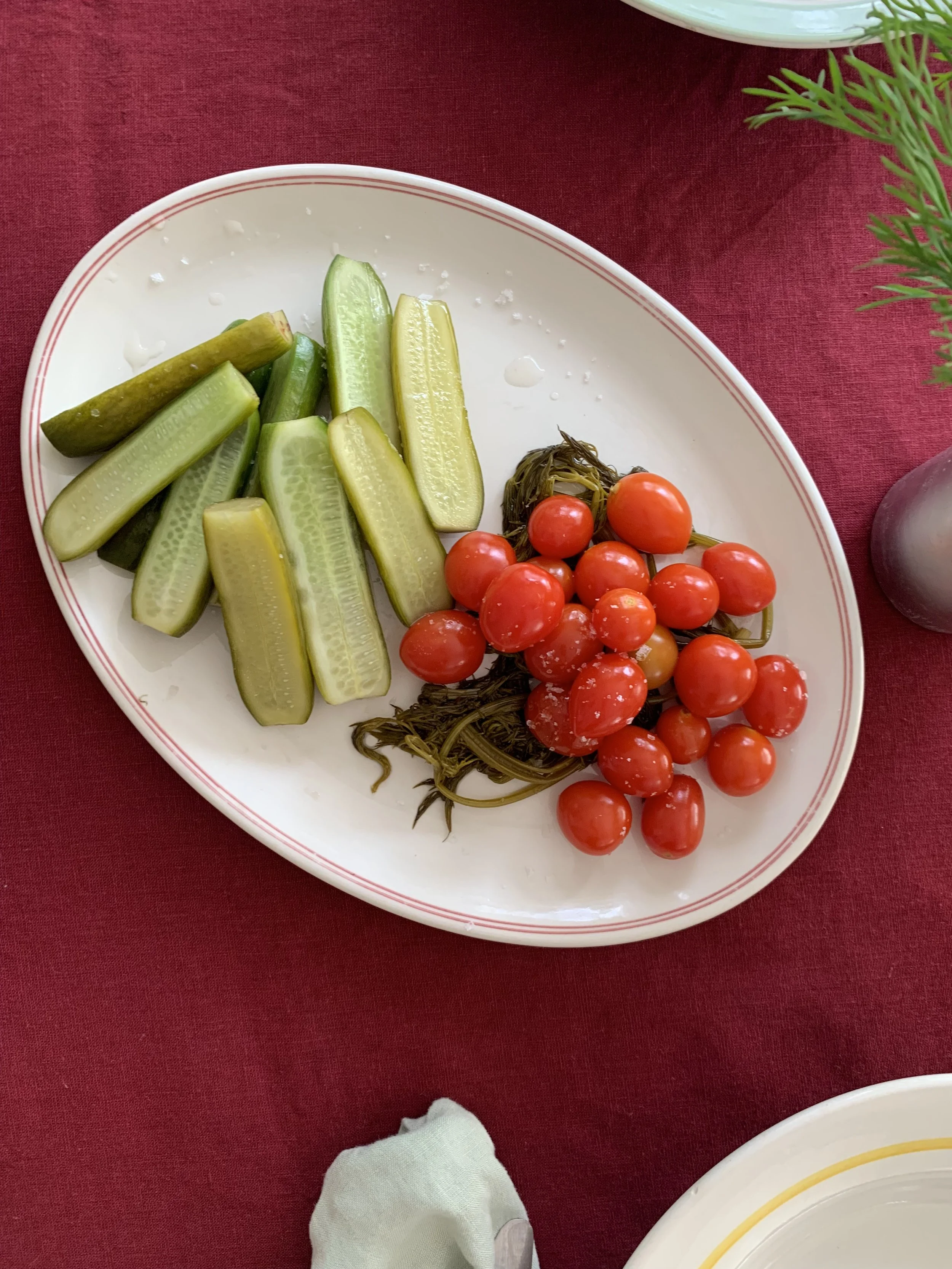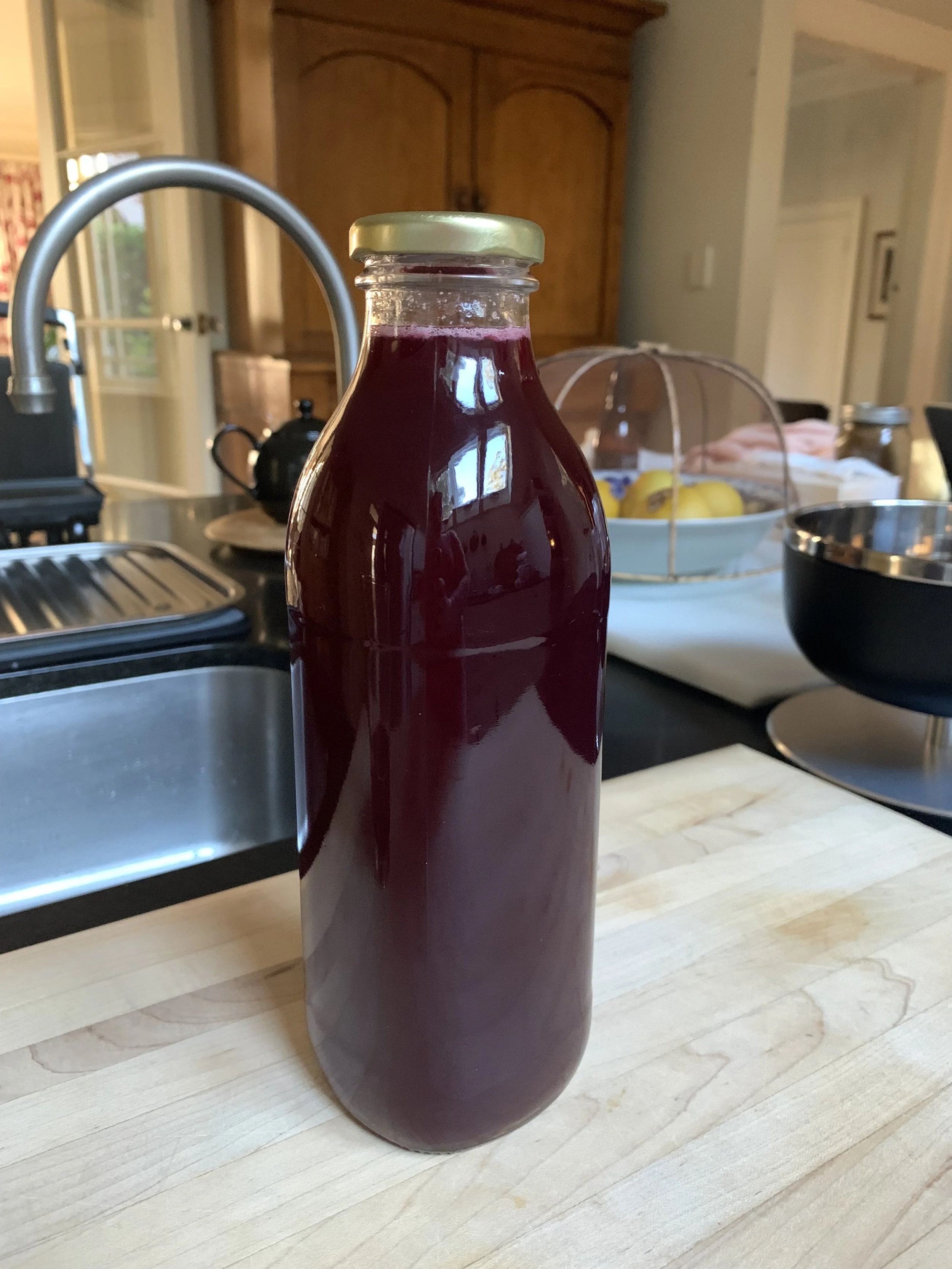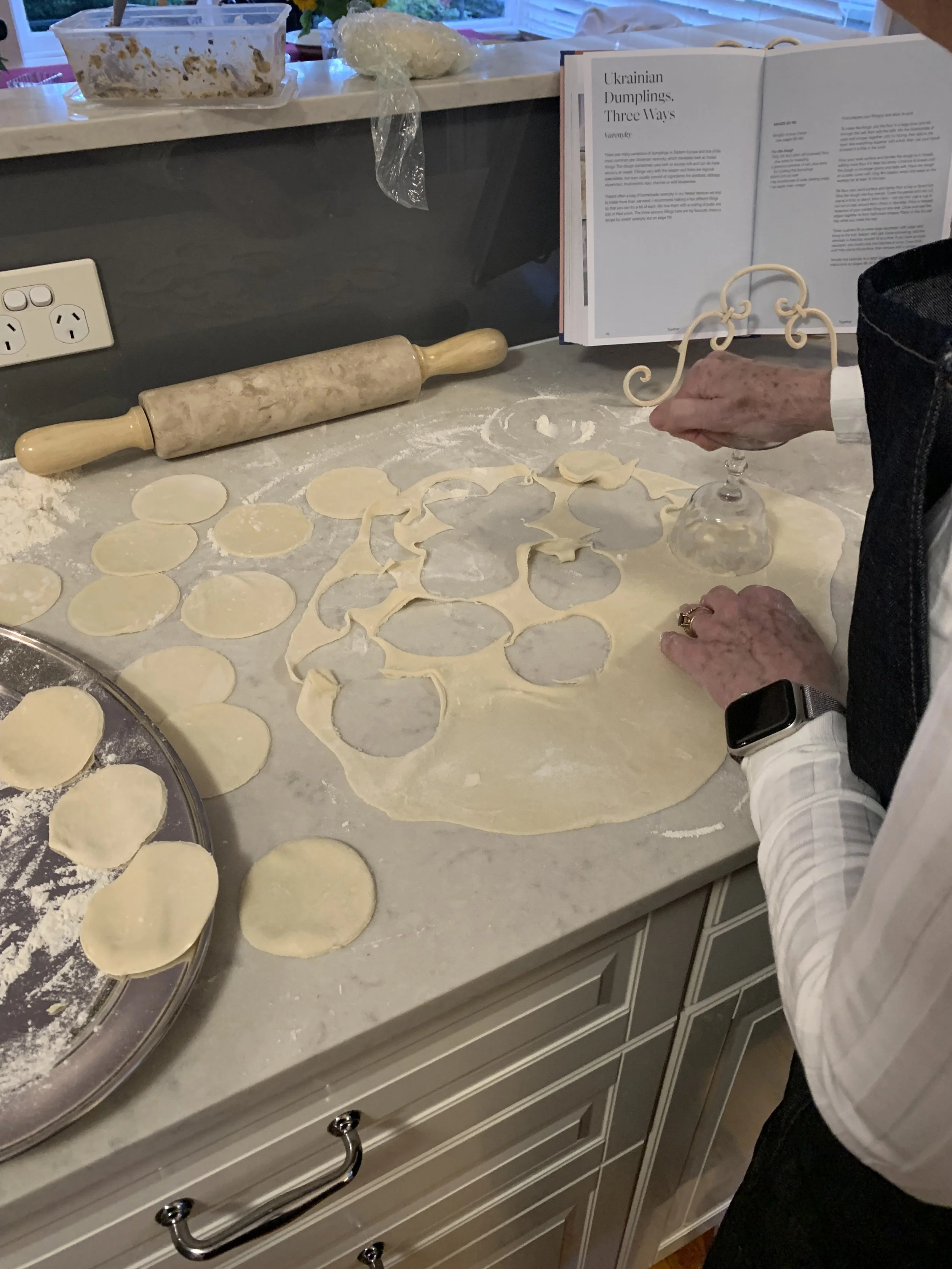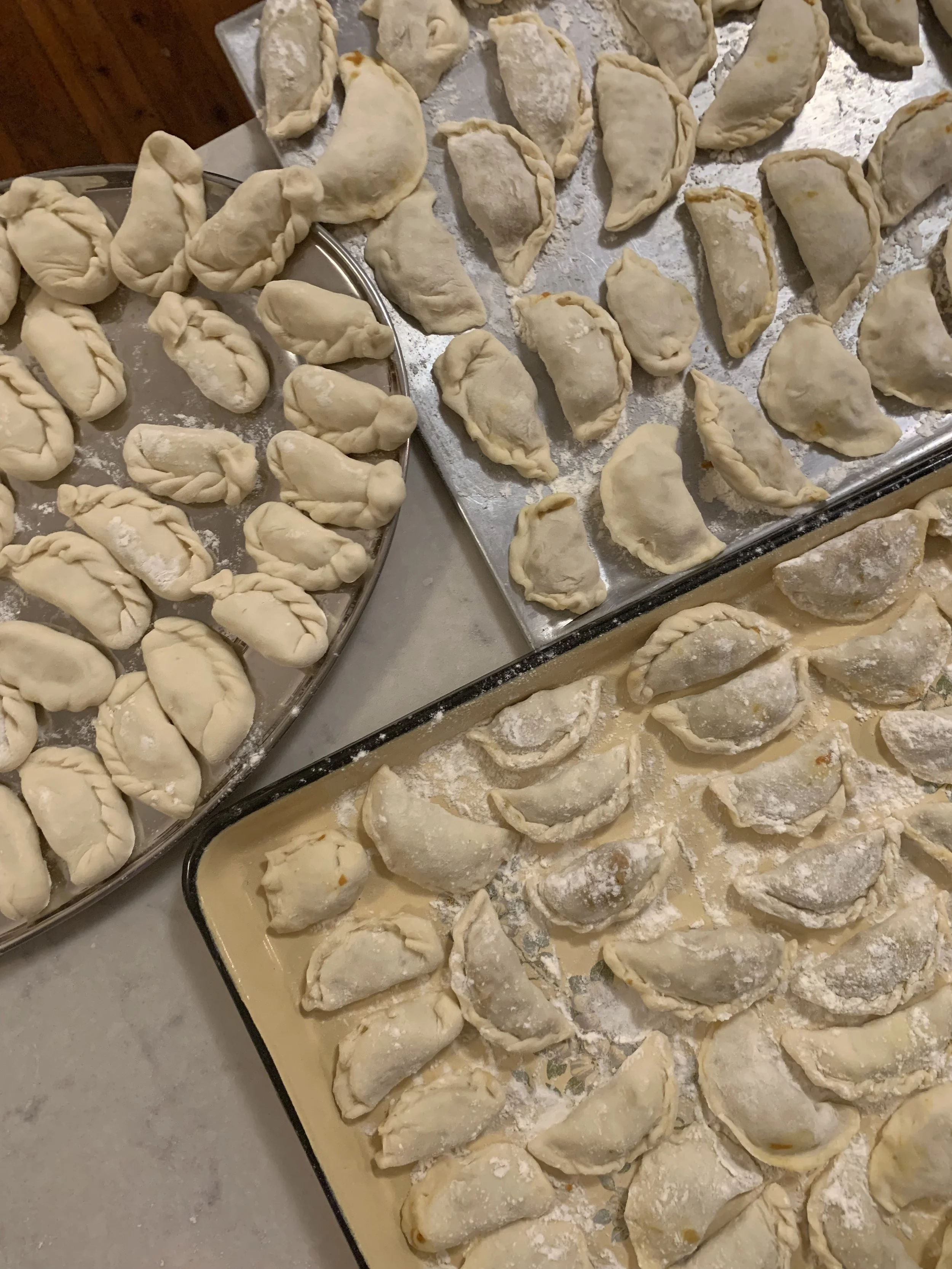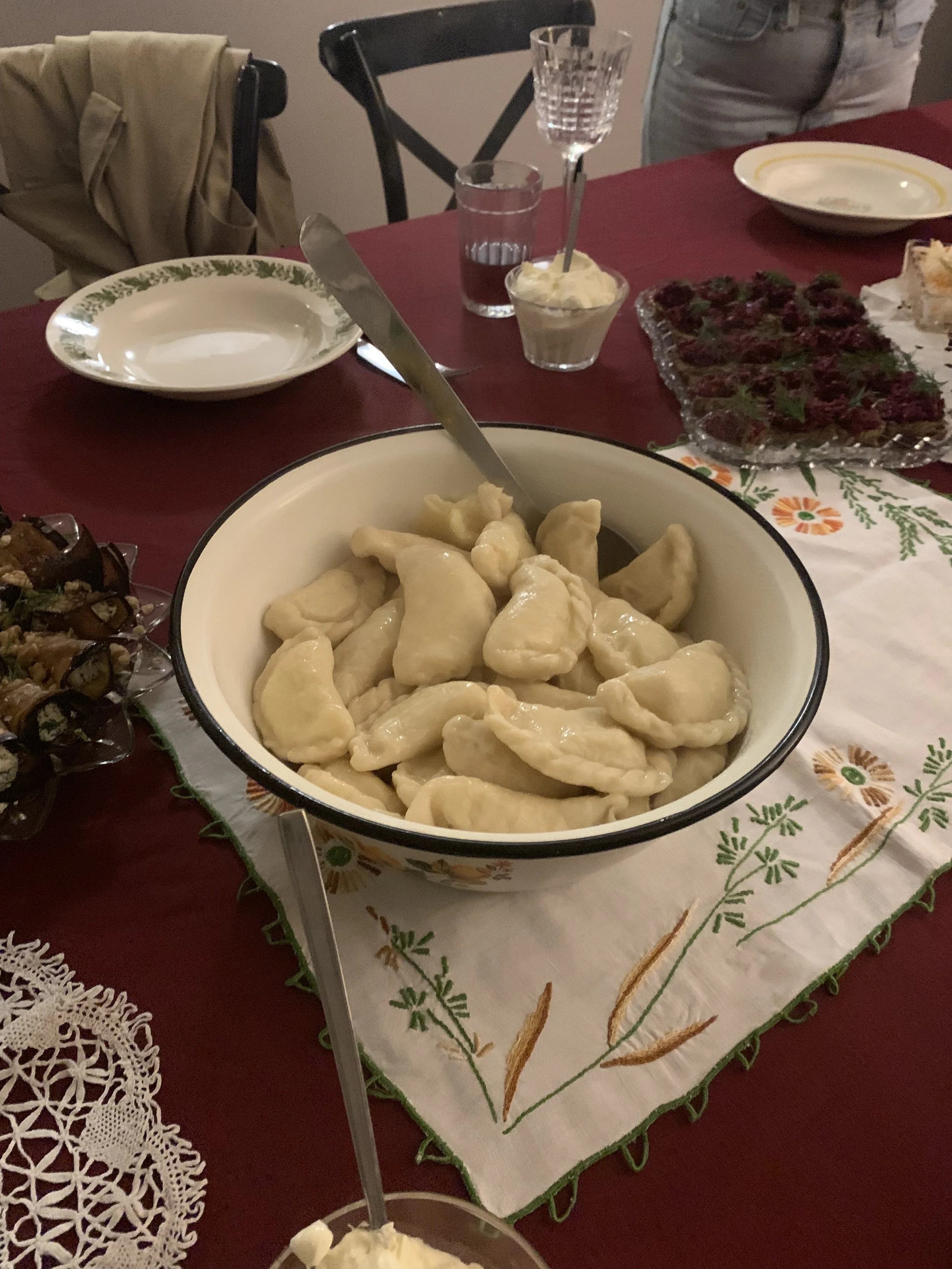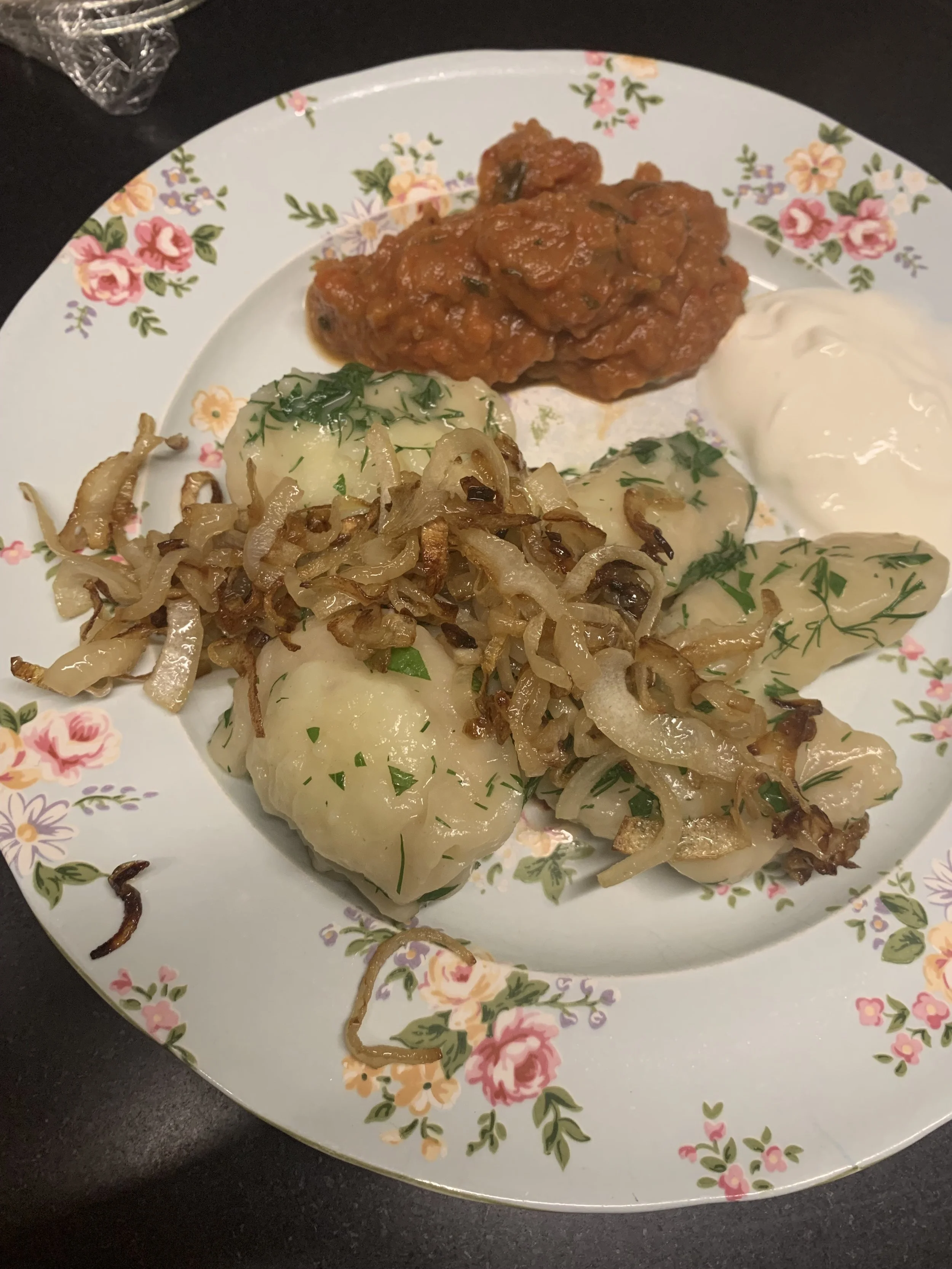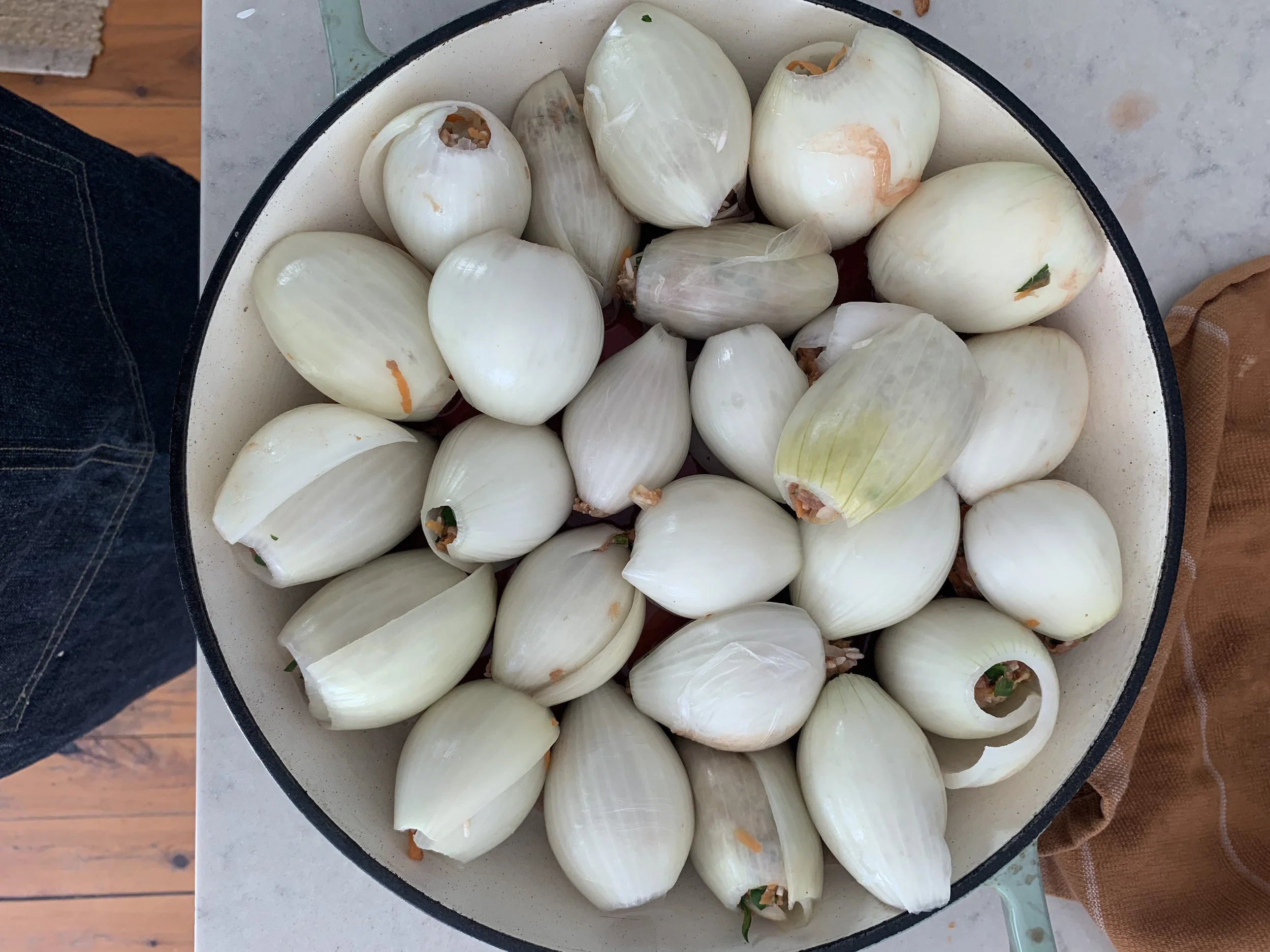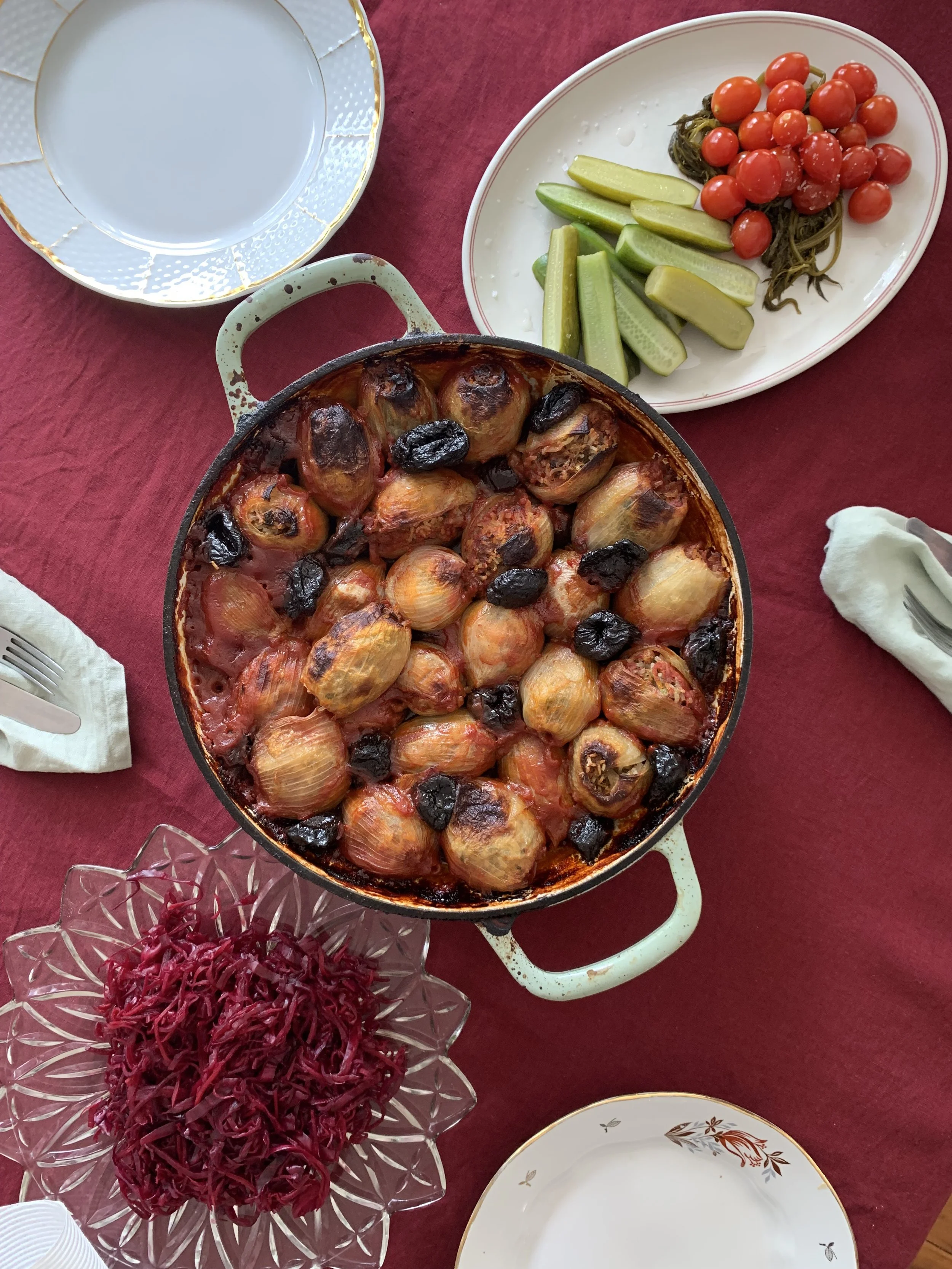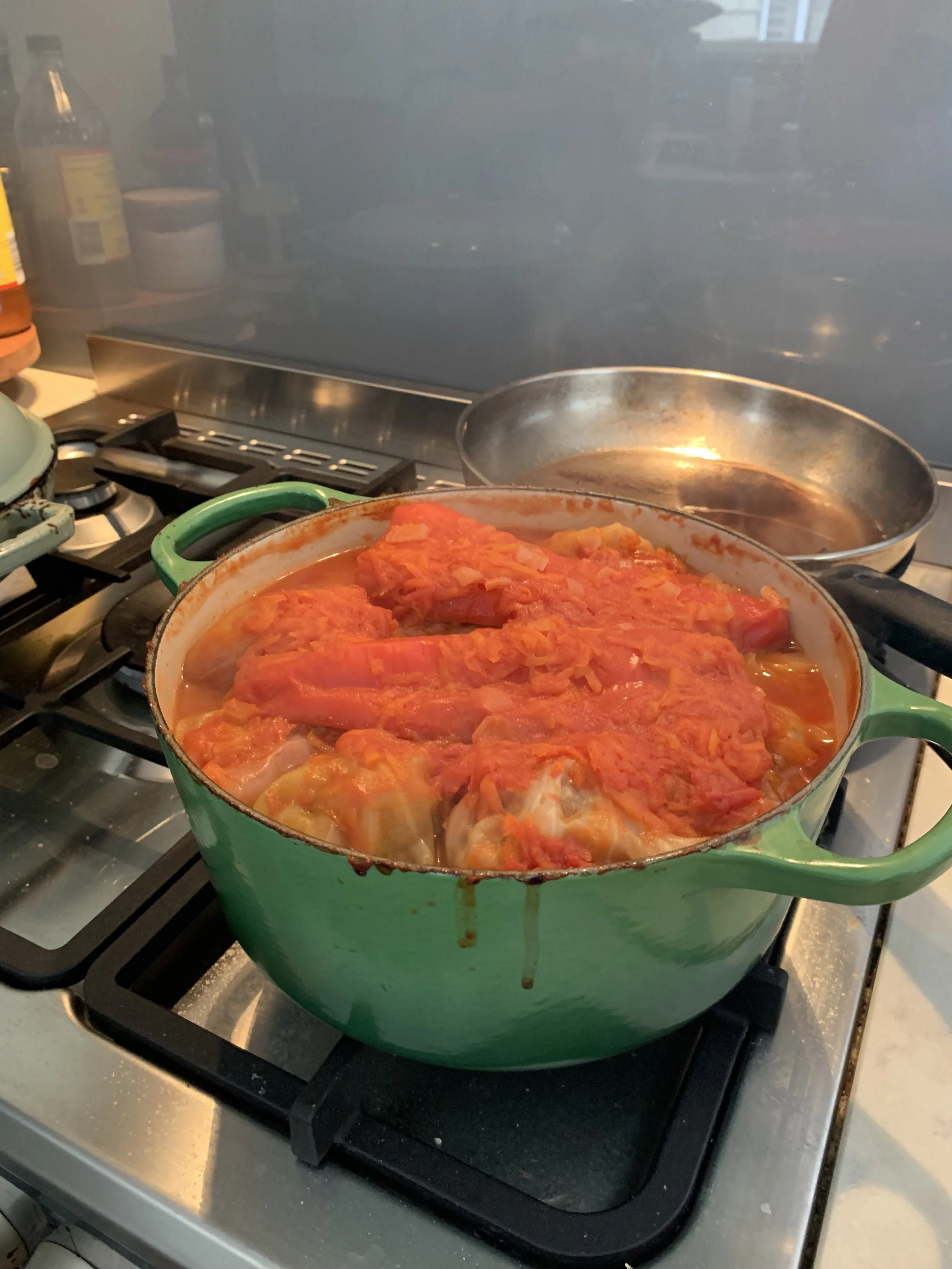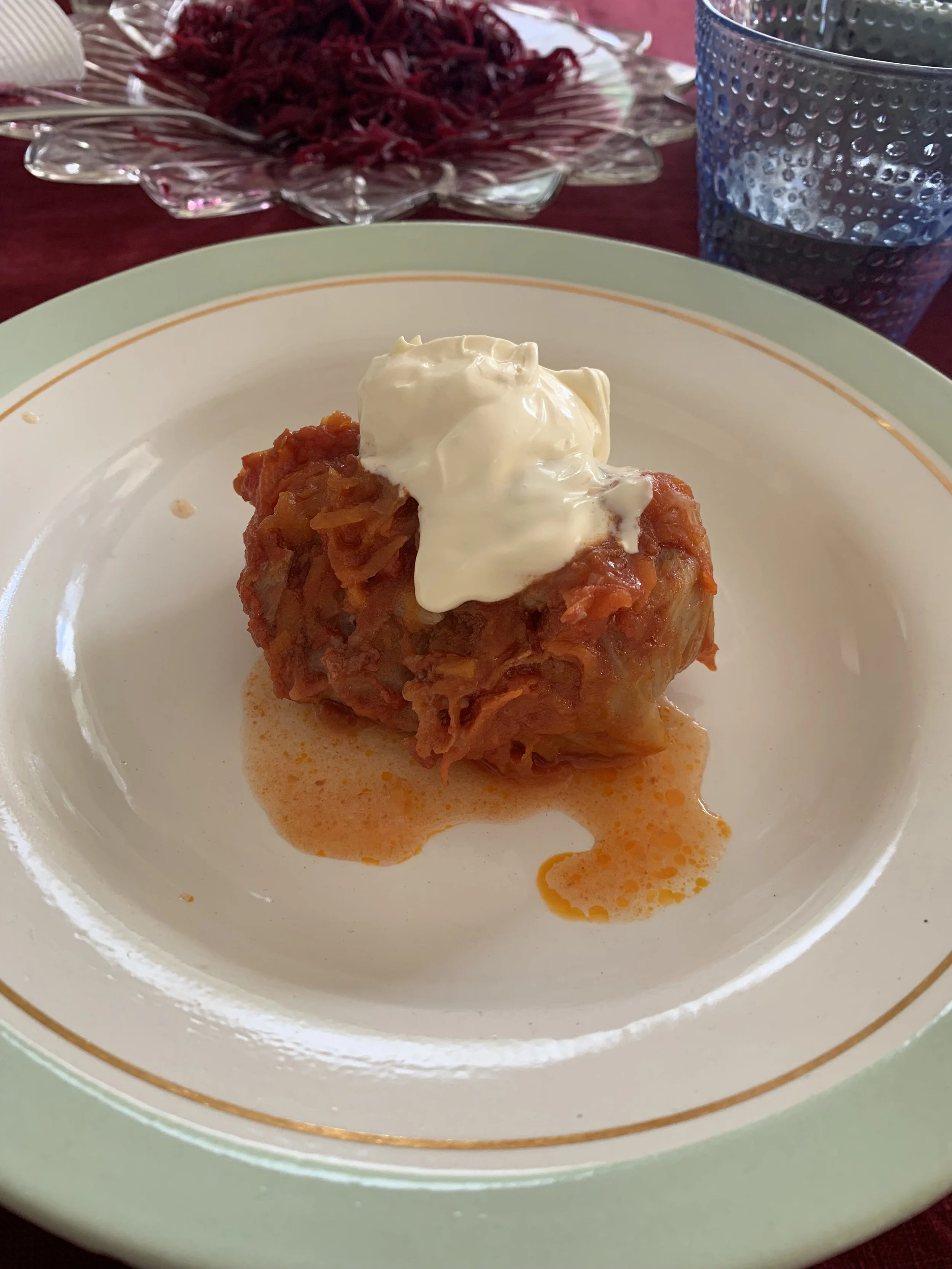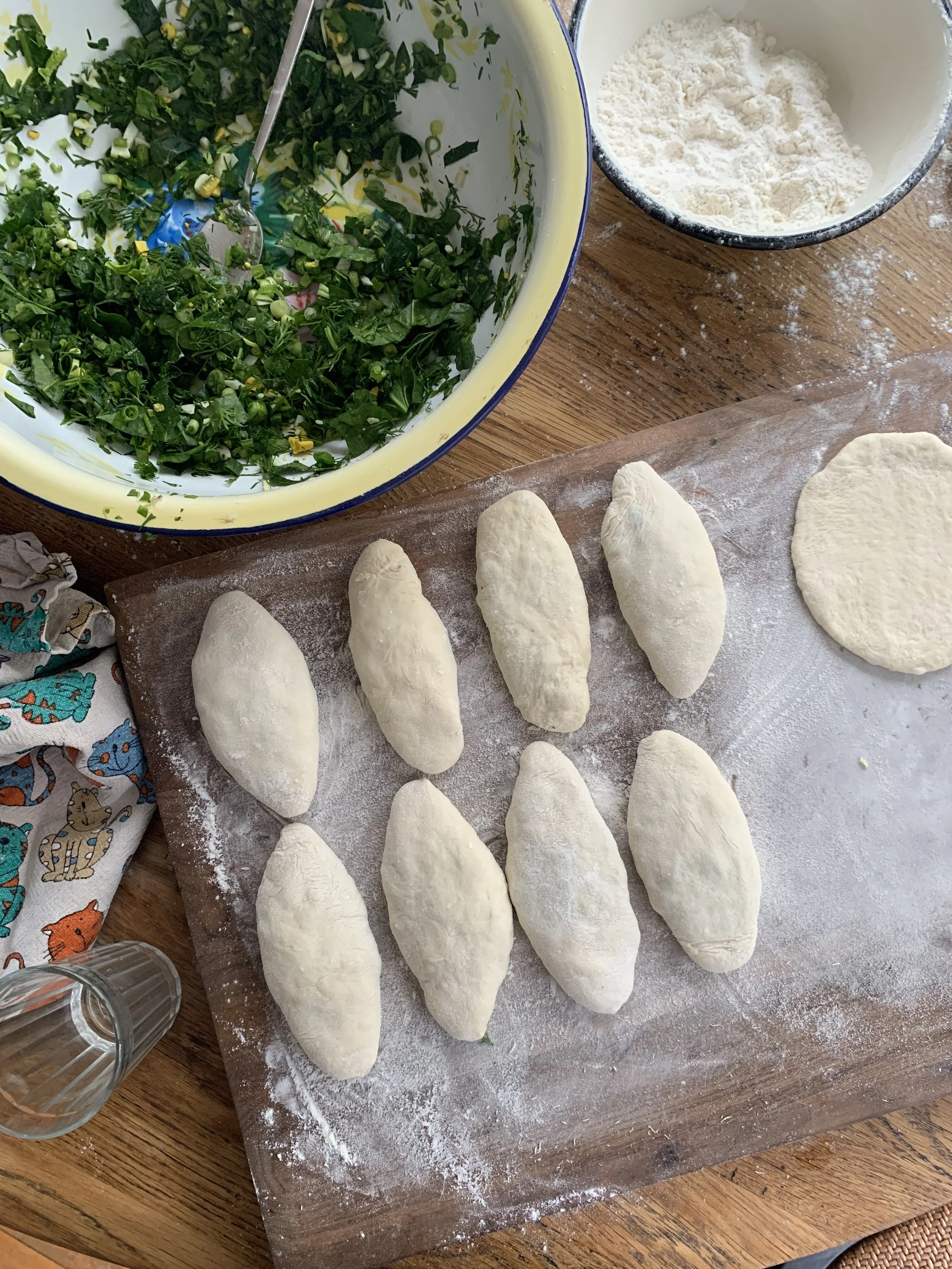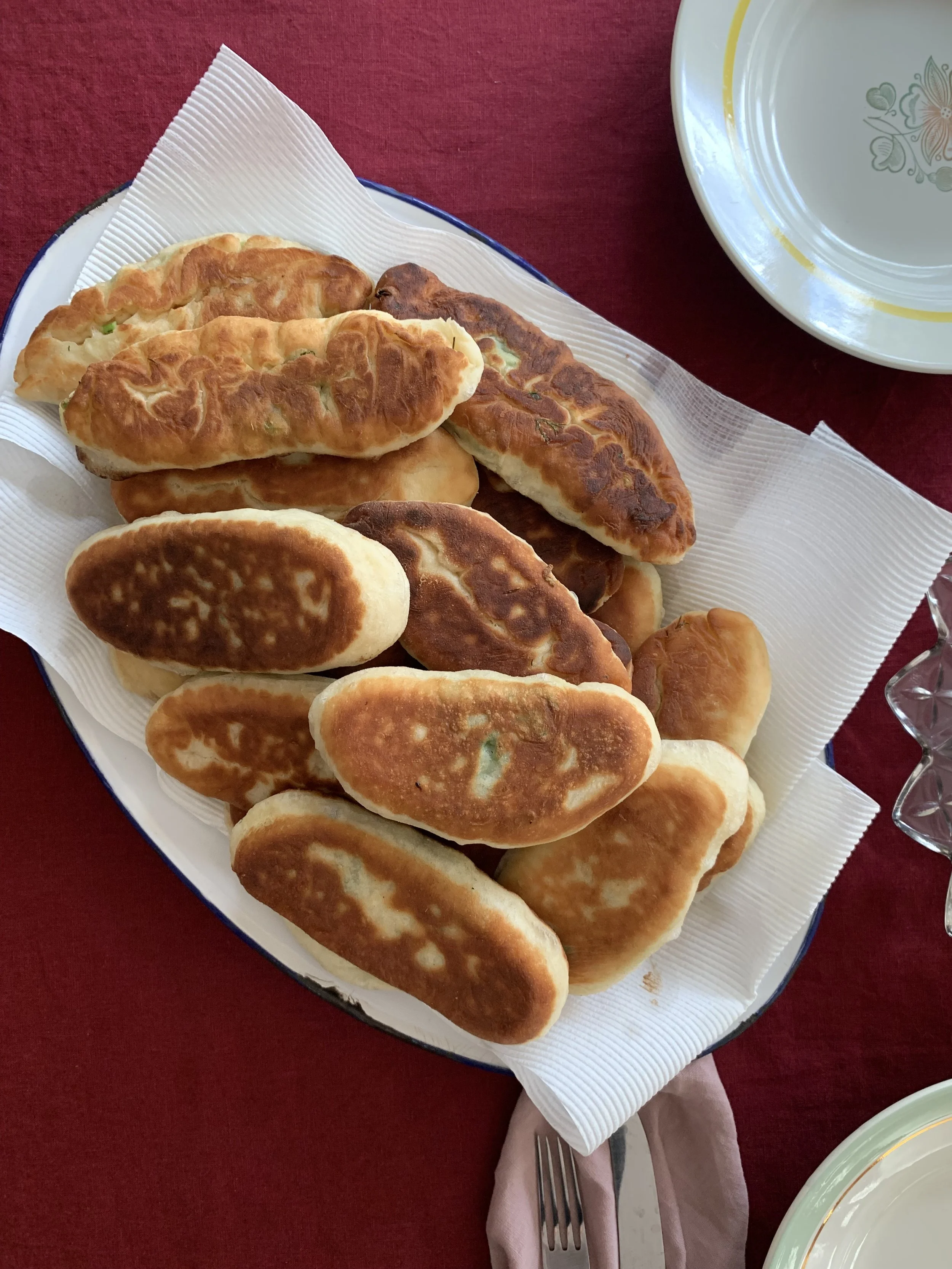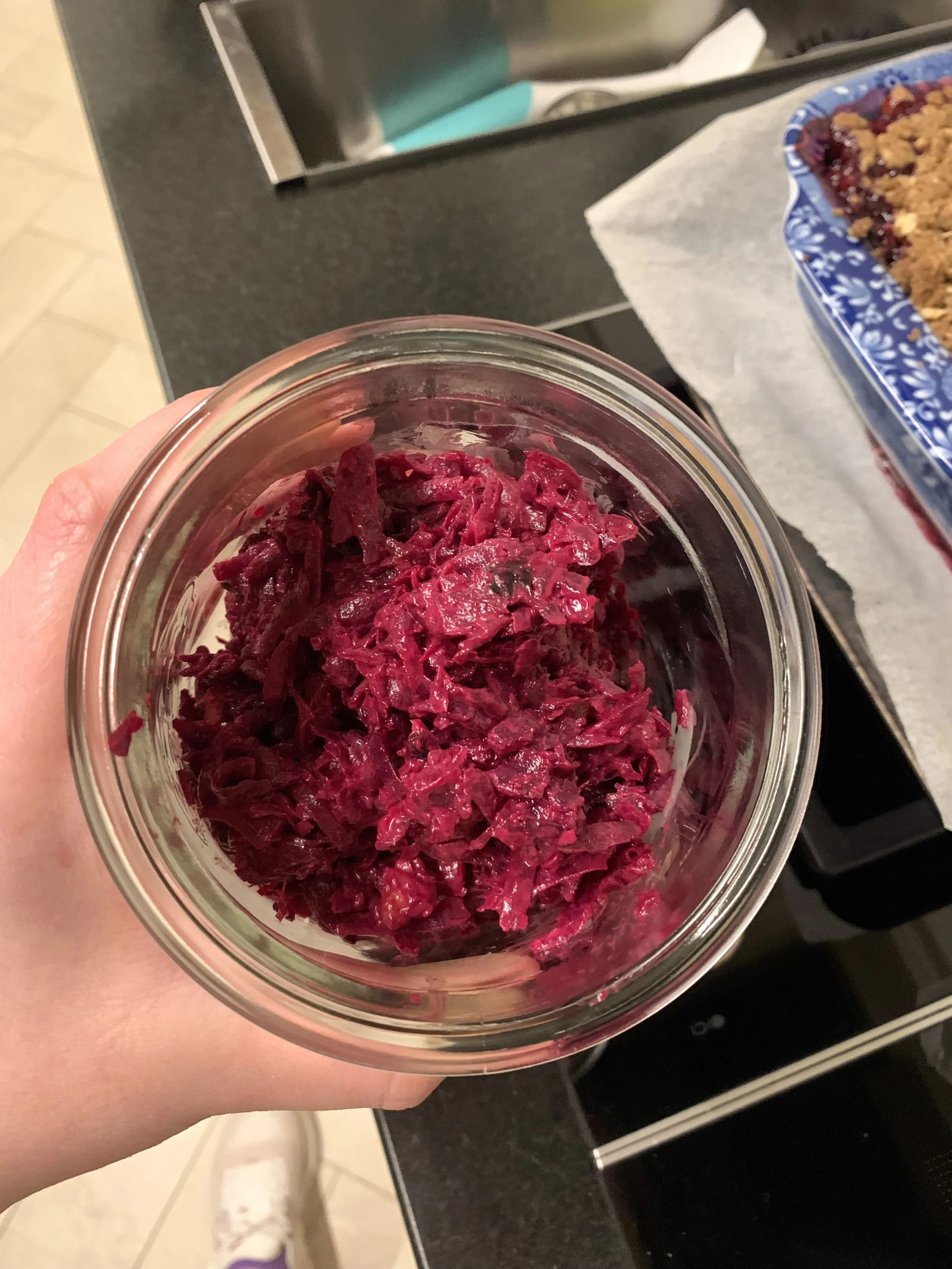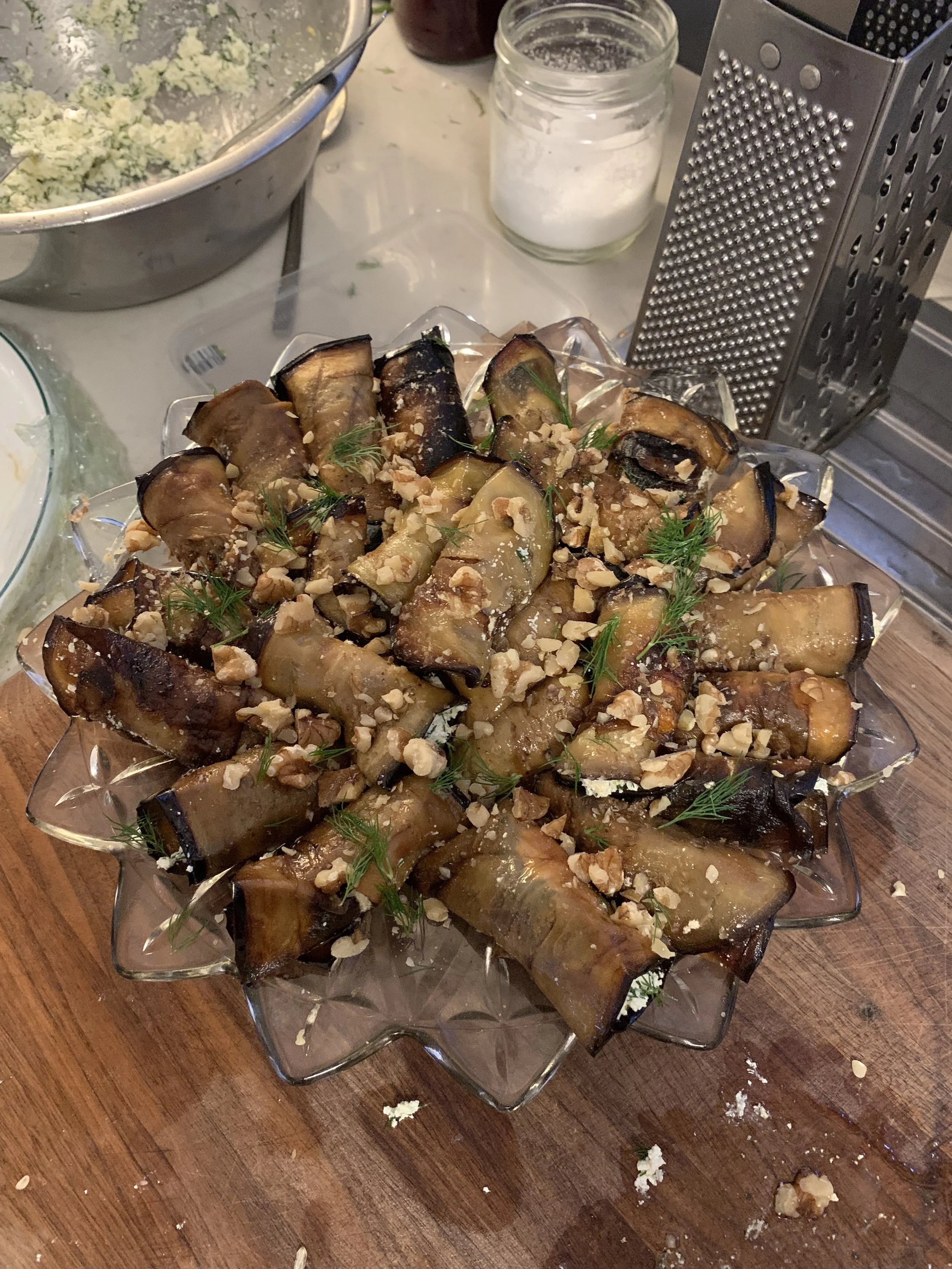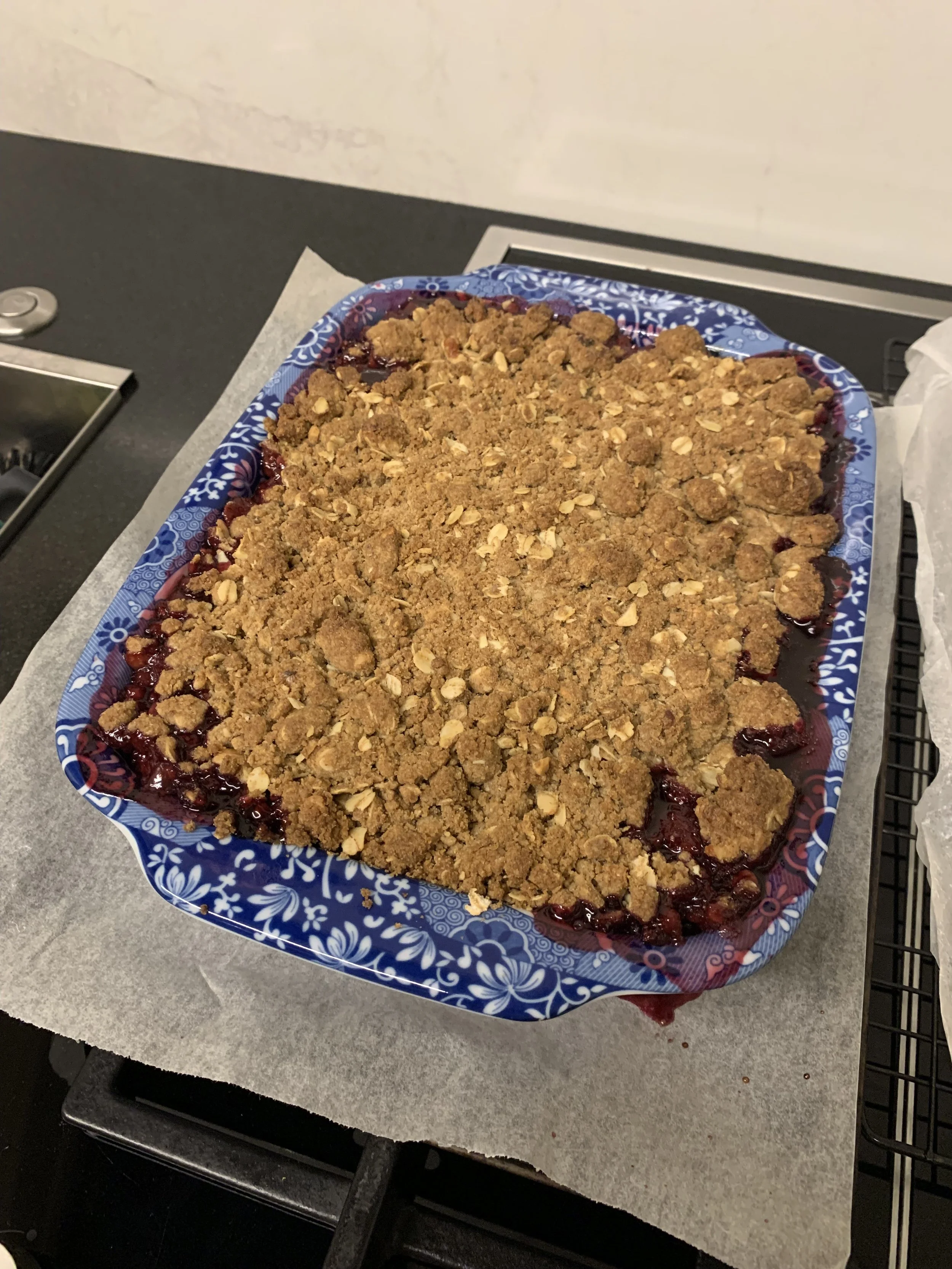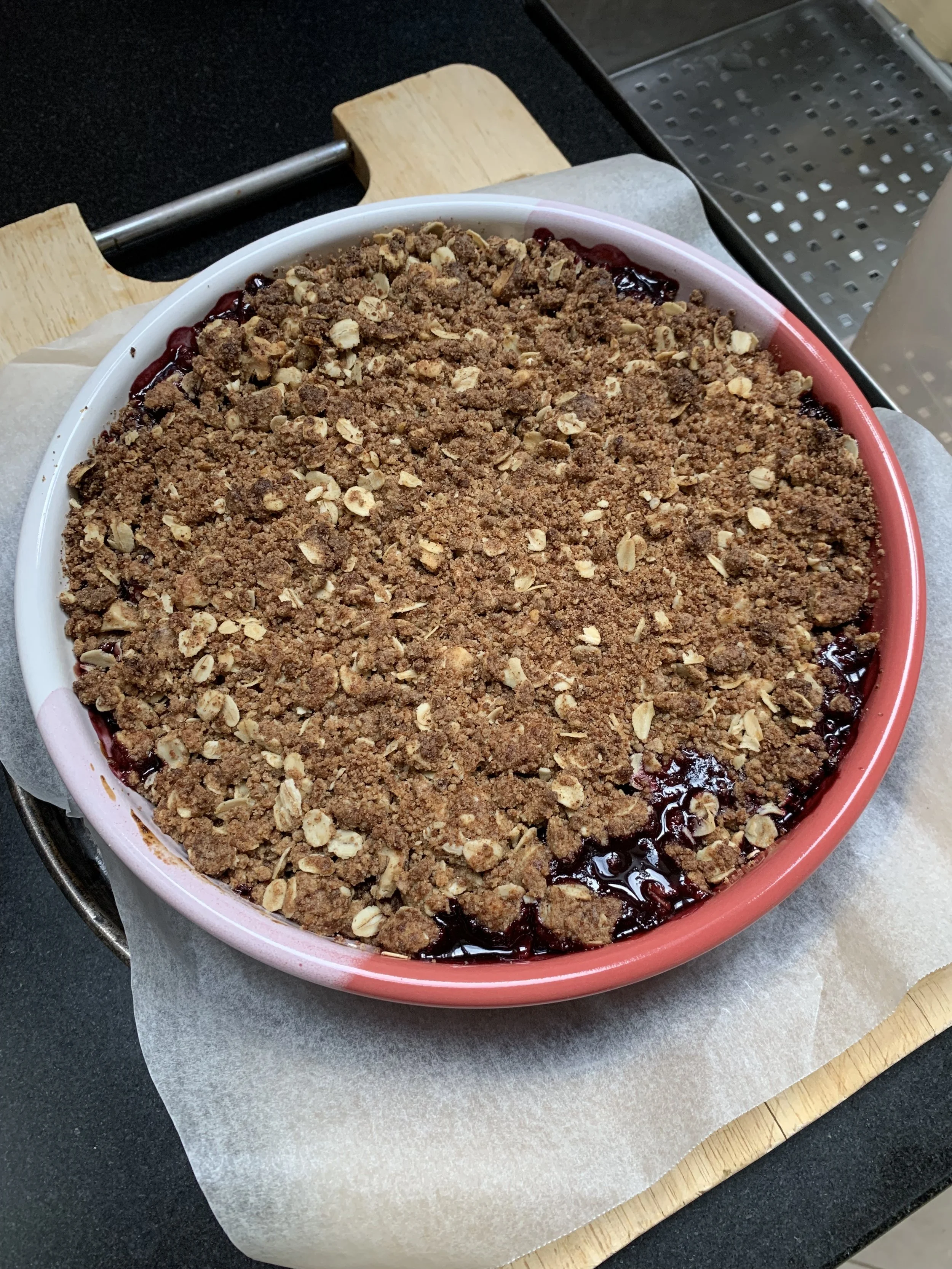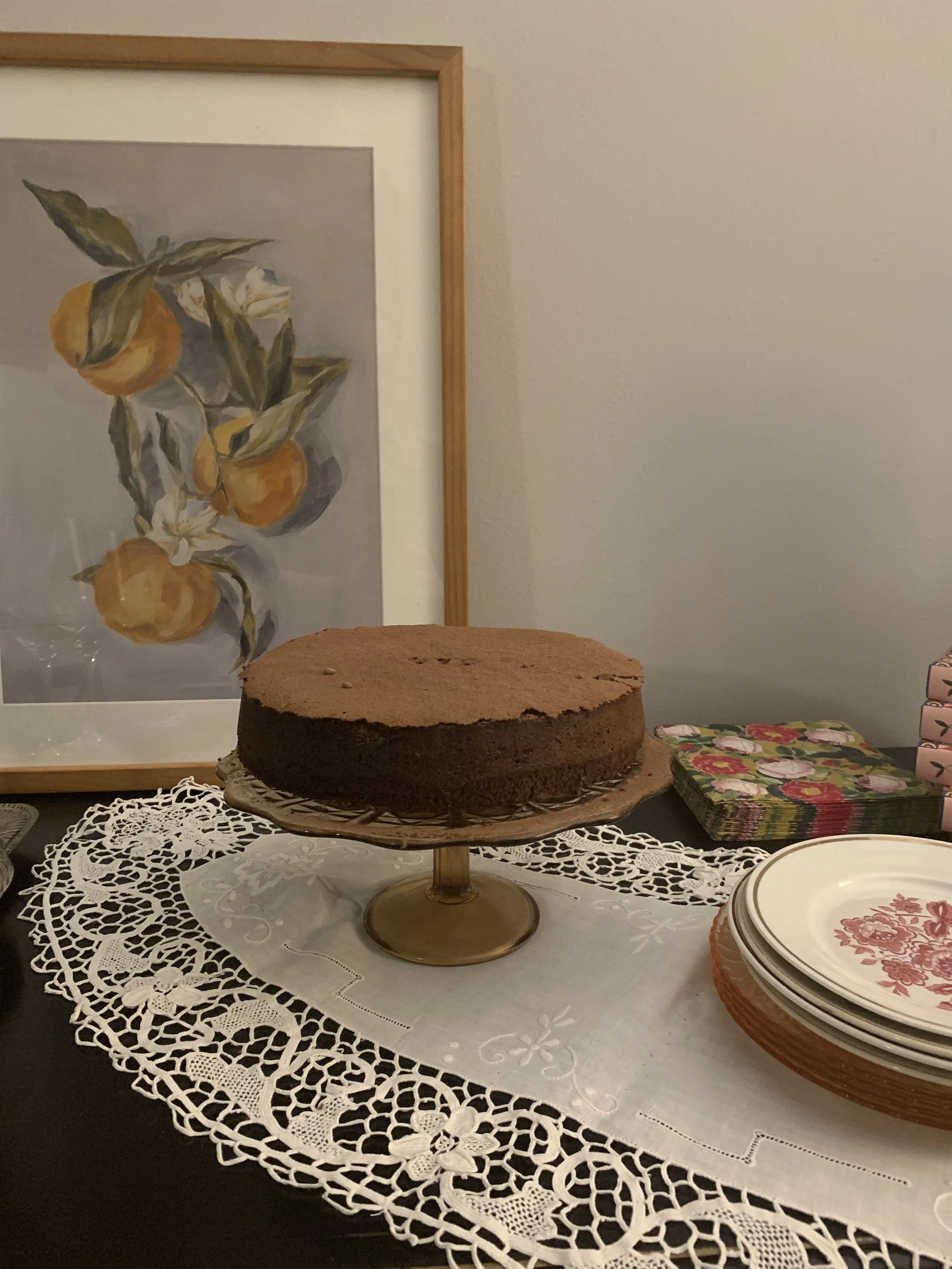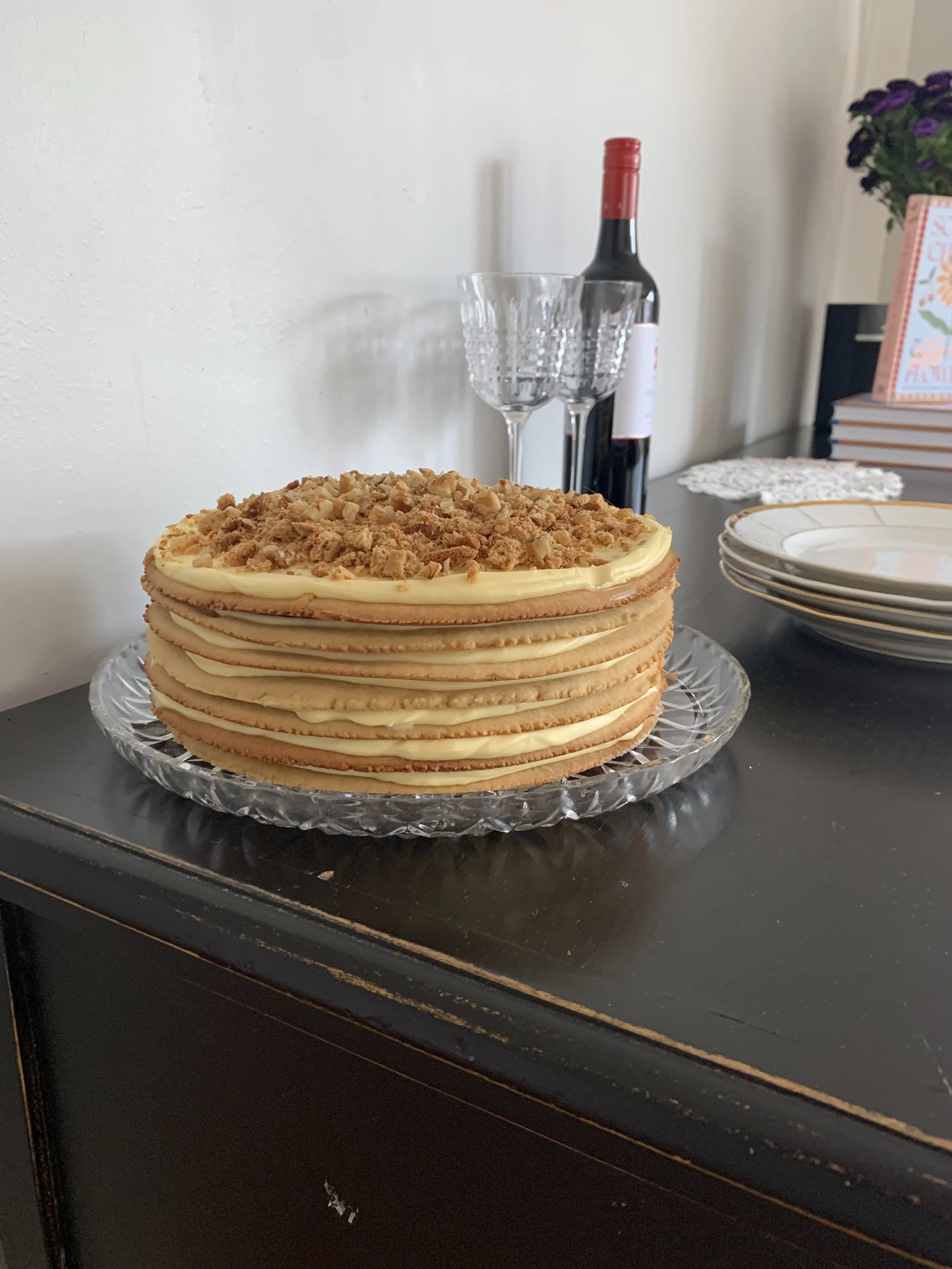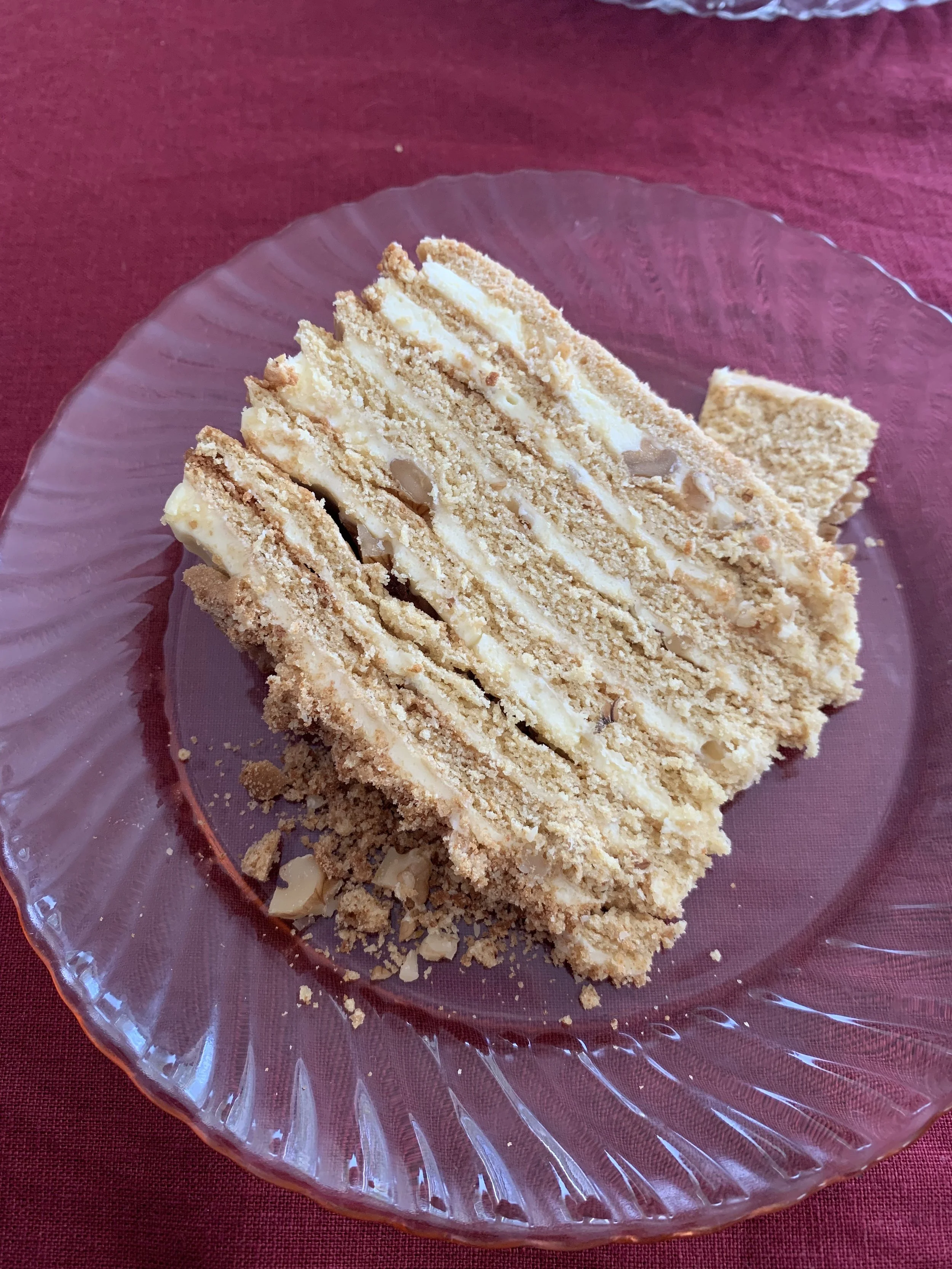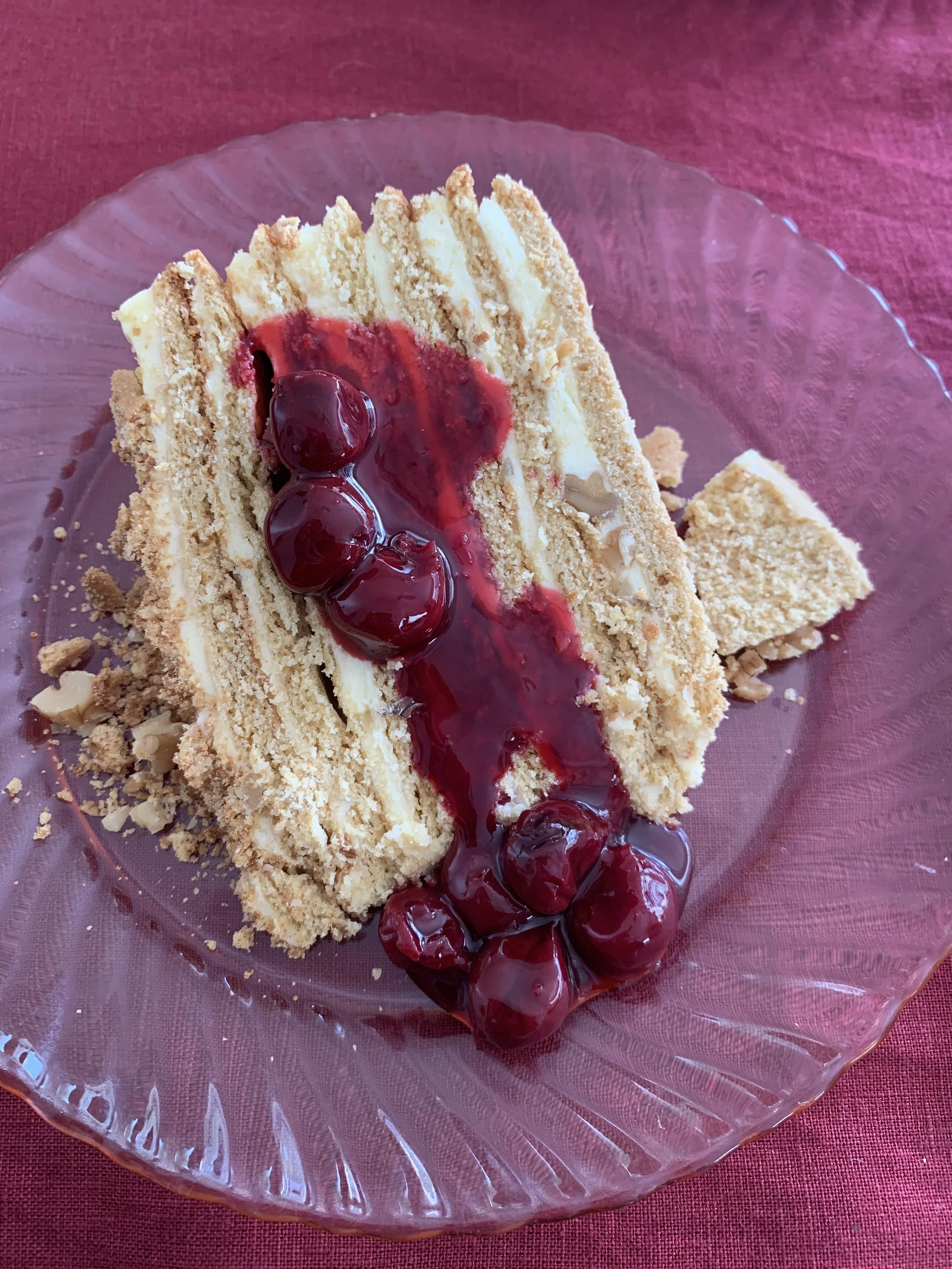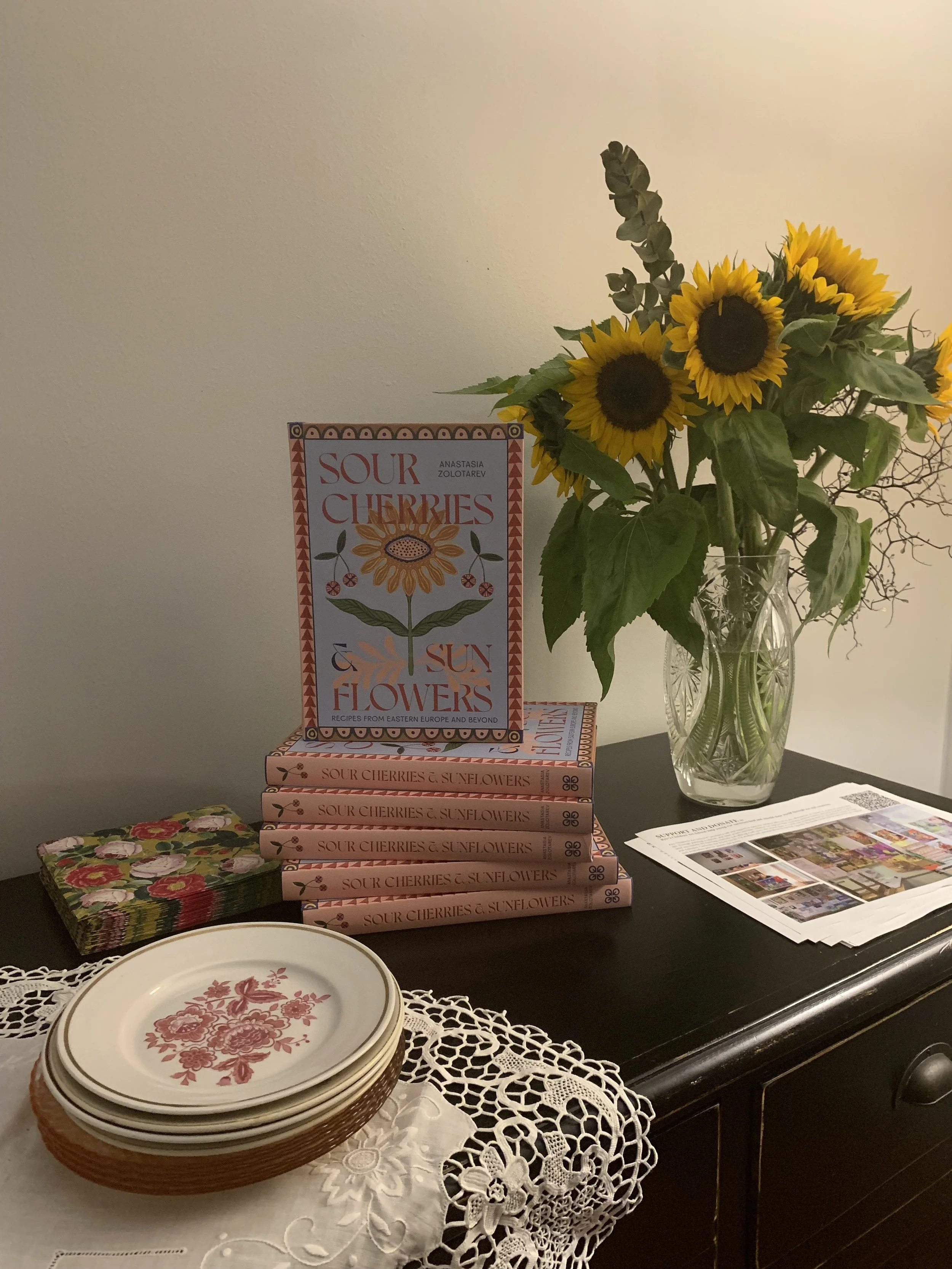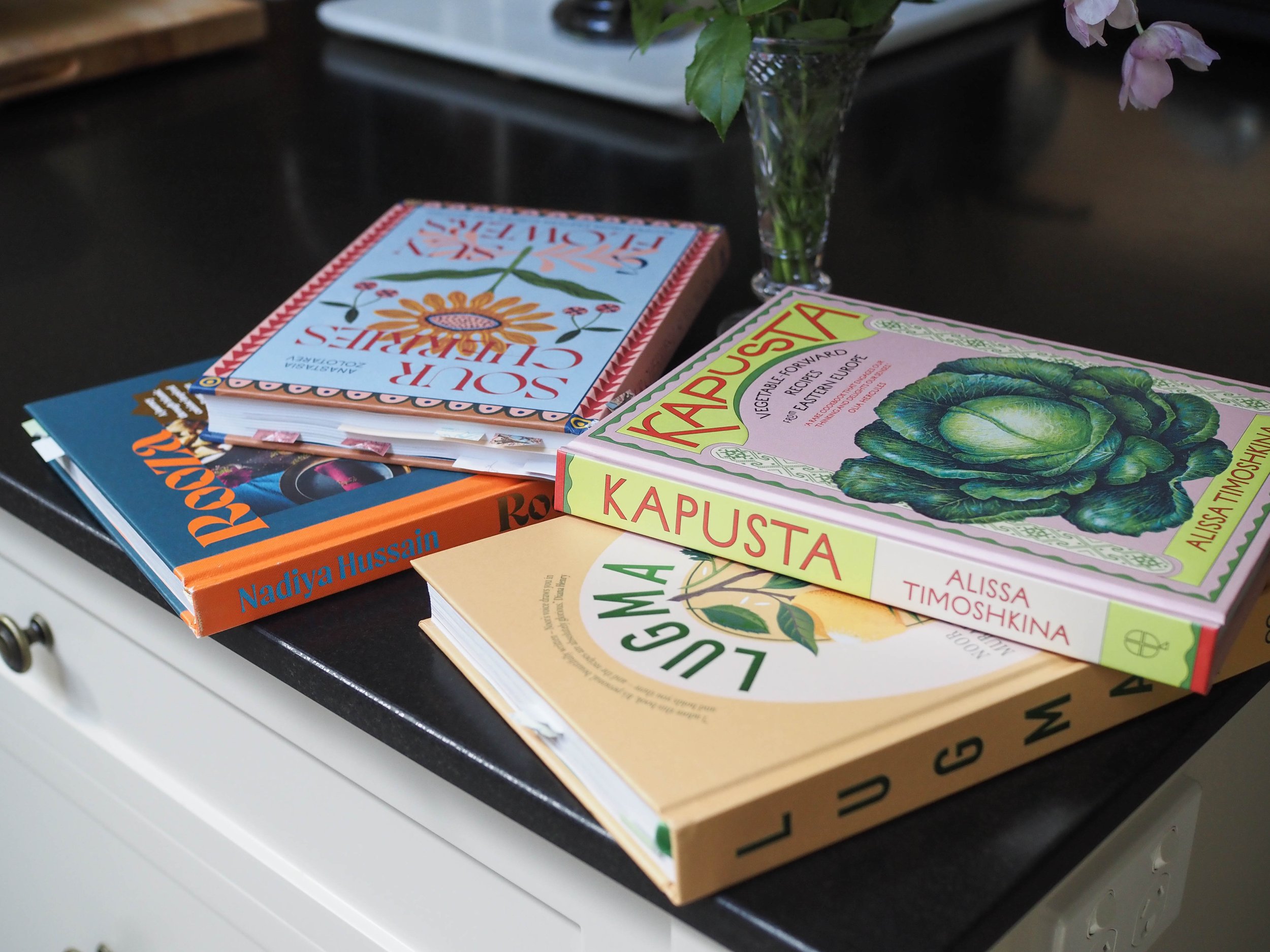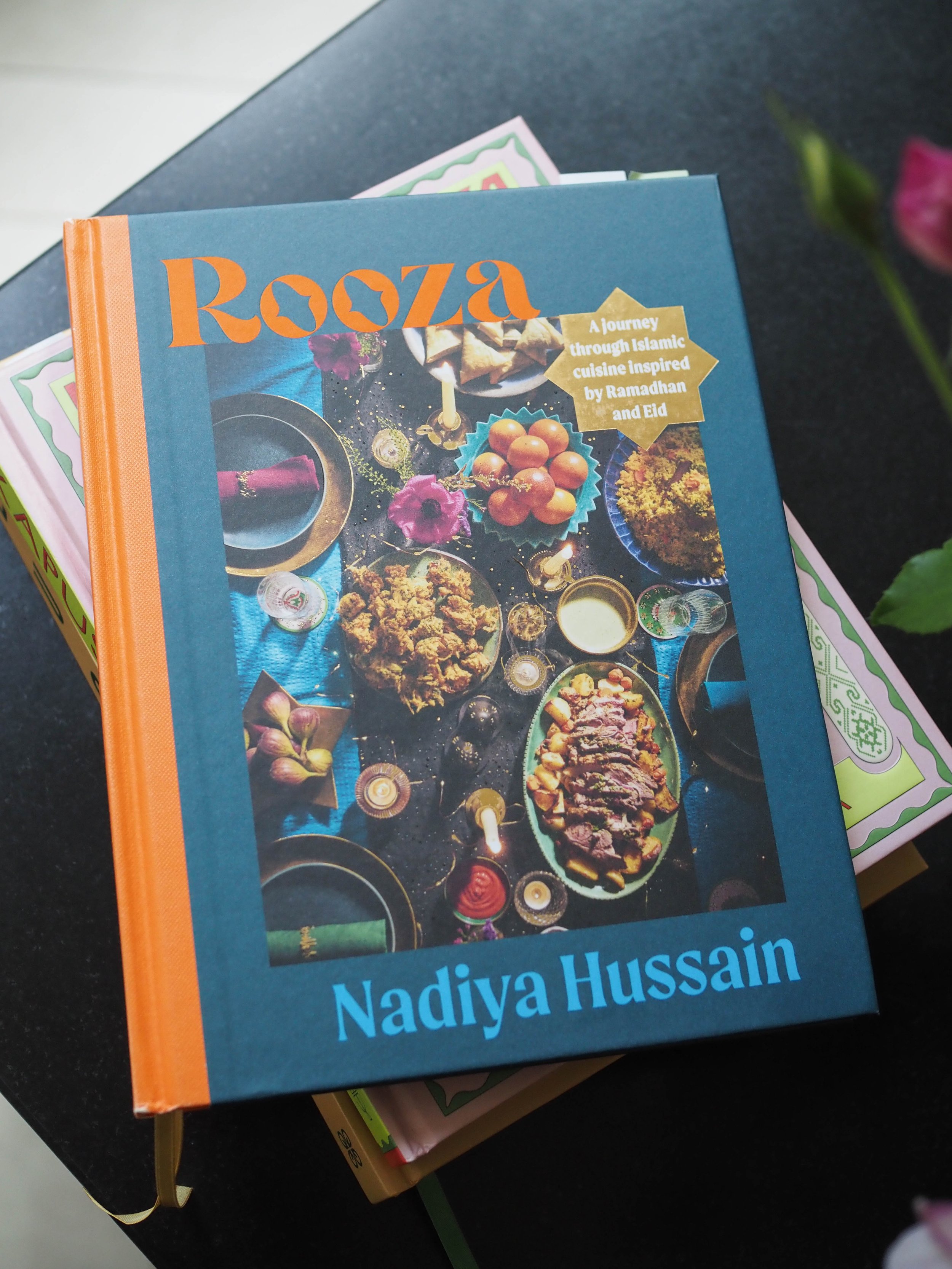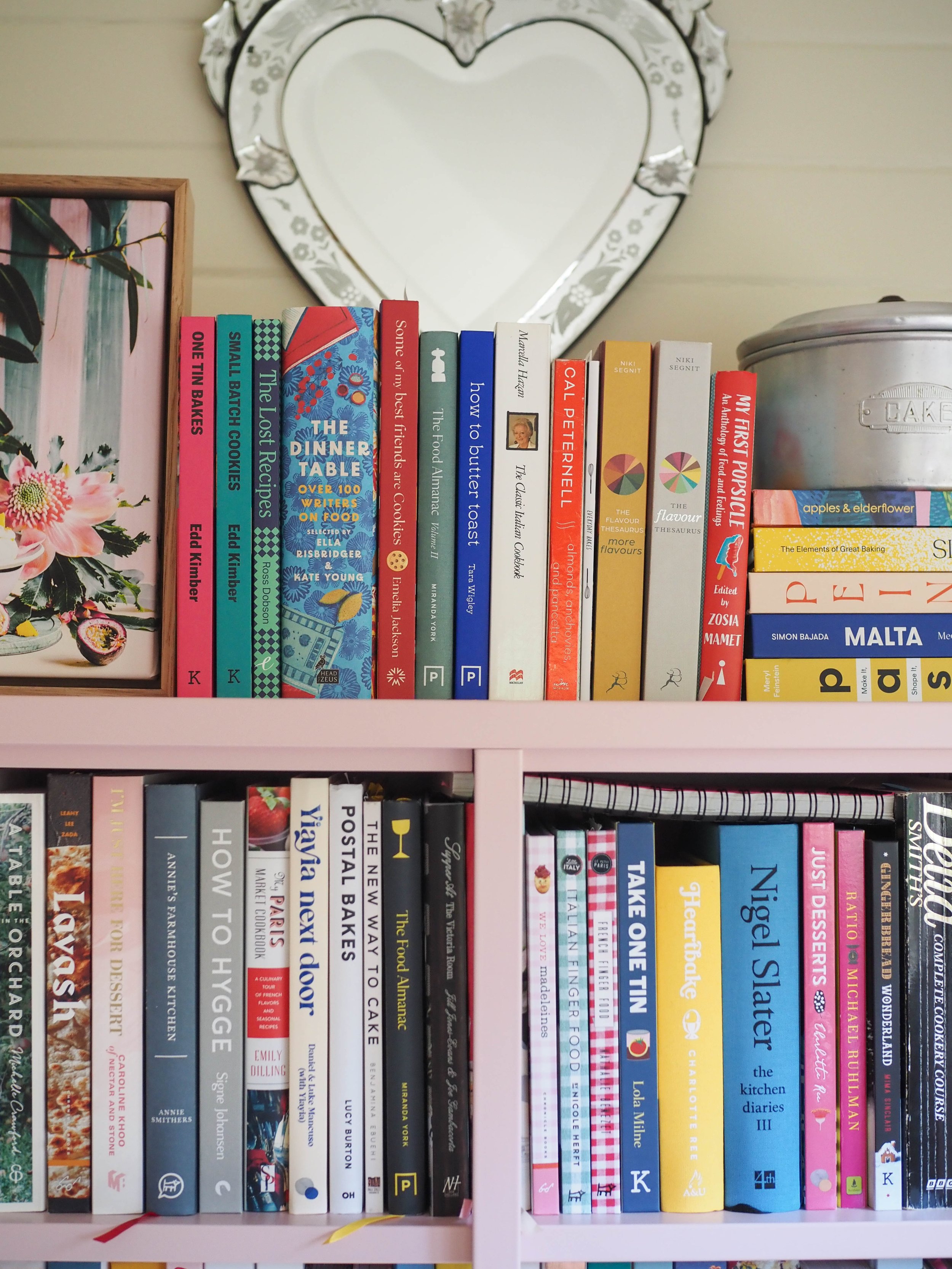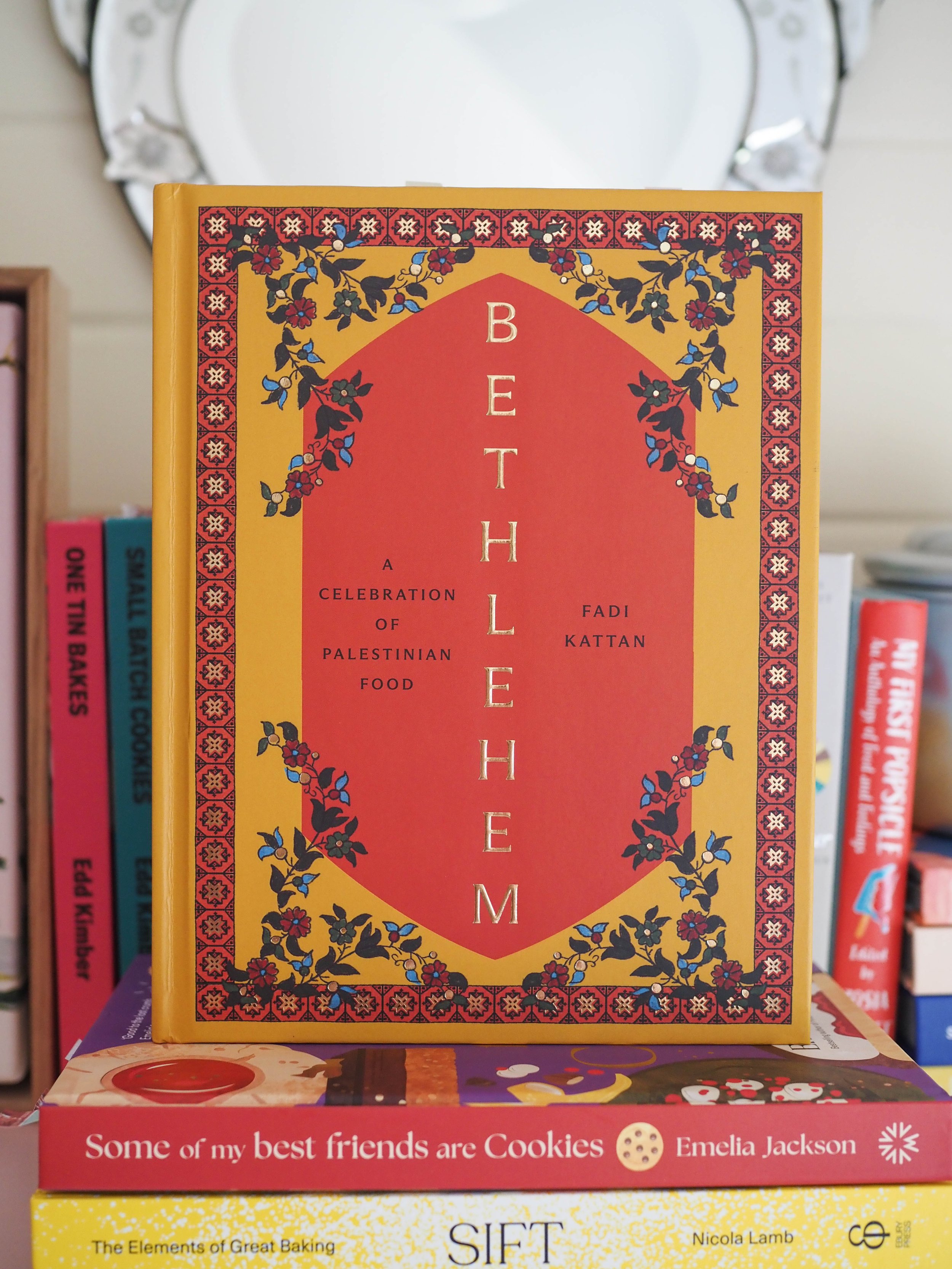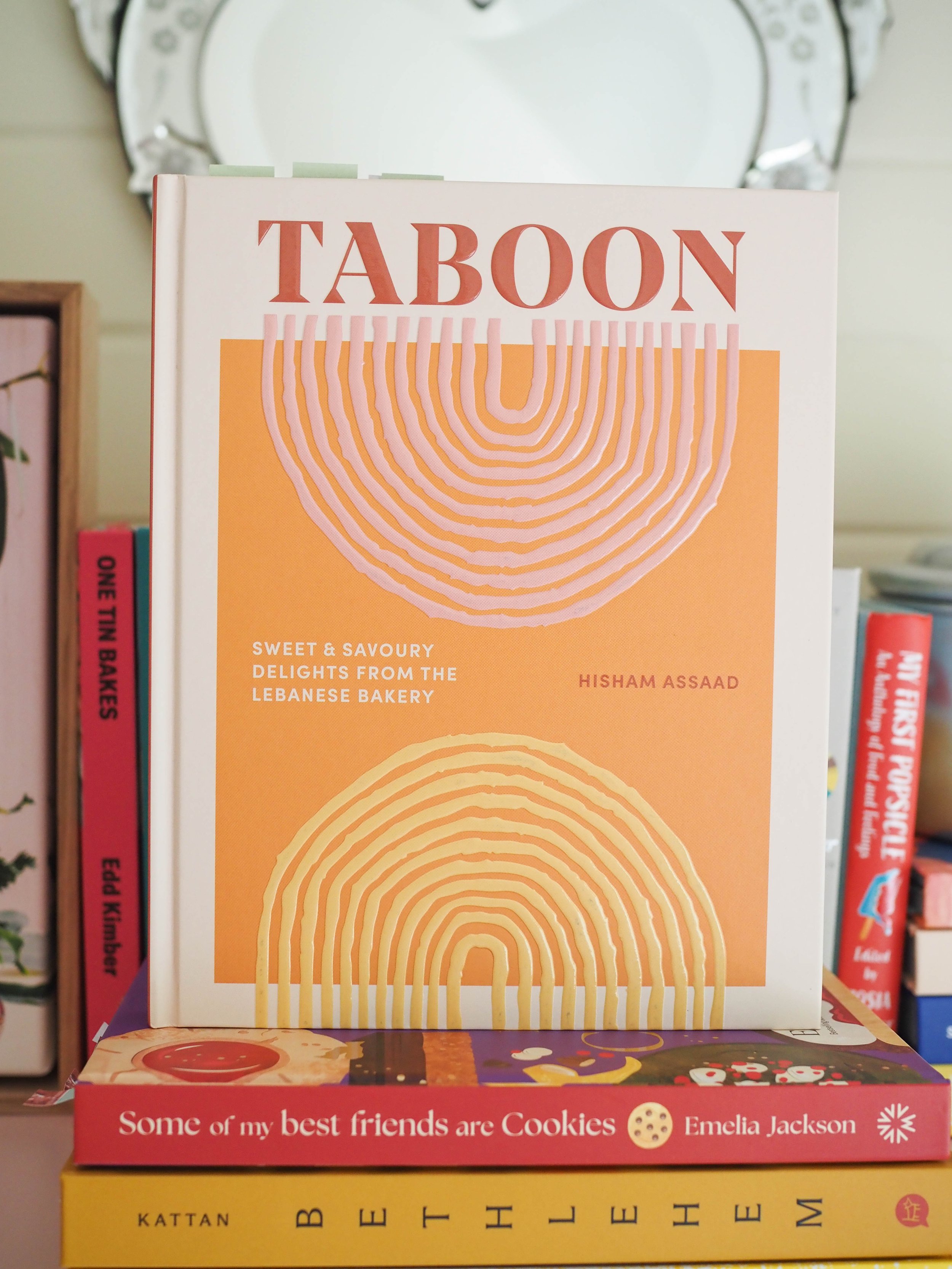Bought At: my copy was gifted to me by the author, however I had already preordered a copy from Booktopia which I then gifted to my Mum, since she also wanted a copy after attending a cooking class with Anastasia.
Recipes Made: I’ve made quite a few things from this book so far, especially as I’ve been able to attend two cooking classes with Anastasia since the books release, so I was able to make and try even more things that I might have otherwise. Going to Anastasia’s cooking classes was a great way of trying recipes I might not have tried, or thought were too involved. I now have not only tried lots from Sour Cherries and Sunflowers, but have so many recipes I want to make again, and have had great exposure to Eastern European ingredients and recipes which has enriched my food life beyond Anastasia’s excellent book.
I made the Herby Potato Salad (p.50) as a side to a main meal, and I really enjoyed it. I love herb filled dishes, so this recipe was perfect for me. I made half the quantity and the leftovers were enjoyed the next day as well. I can see myself re-making this in the warmer months as it felt like it would be a great Summer salad.
At the first cooking class I attended with Anastasia in May, I tried sauerkraut for the first time! Anastasia had made her Sauerkraut with Apple (p.64-5), and we got to try it on it’s own, it was also added to one of the other dishes we cooked that evening plus it was served as a side when we sat down to eat. I really enjoyed trying the sauerkraut, the addition of the apple was really nice. I now feel like I’ve tried the best kind of homemade sauerkraut first up, and any bought version might not compare! At the second cooking class I went to in August, I also got to try a red cabbage variation which was equally delicious. I think making some homemade sauerkraut is in my future!
red cabbage sauerkraut
At the second cooking class, Anastasia had made some Fermented Dill Cucumbers (p.66) and Pickled Tomatoes (p.68). She explained that the fermented dill cucumbers are different to dill pickles, with the fermented variety being something you can make and eat soon after (like the next day or so), there’s no need to wait like some you might for some other kinds of pickles. While my sense of taste and smell isn’t very good at the moment, I enjoyed the fermented dill cucumbers, despite their milder taste (anything with a milder taste is harder for me to detect any flavour from at the moment unfortunately). I would definitely try making them myself (especially once my senses of taste and smell have improved), and I think if you find pickled cucumbers too strong, these fermented ones could be a great option for you.
fermented dill cucumbers and pickled tomatoes
The pickled tomatoes on the other hand had a stronger flavour, and I could definitely taste the vinegar in them. The tomatoes (cherry tomatoes) held their shape and juice, so when biting into one you got a hit of juicy tomato coupled with the addition of the brine-y flavours of the pickle. I will definitely be making these again especially when tomatoes are in season.
Another recipe I was able to try at the first cooking class was Kompot (p.90-91). Kompot is like a Ukrainian version of cordial, though I think its much nicer, less concentrated and sugary than cordial. At the cooking class Anastasia had made a sour cherry version of the Redcurrant Kompot (p.91), which was refreshing despite it being quite mild for me with my taste and smell issues. Another thing to make myself once my situation improves! I have since made an Apple and Blackcurrant version of Anastasia’s recipes, with guidance from Anastasia after finding frozen blackcurrants at a shop not too far from me. I think kompot is something I will be making a lot of in Summer, as I really enjoyed drinking it cold and it’s a great way to use fruit and have a delicious drink that isn’t overly sweet.
apple and blackcurrant kompot
The main focus of the first class I attended with Anastasia was Varenyky (p.94), which are Ukrainian dumplings a similar kind of thing to ravioli in a way. We made the kefir based dough which features in Sour Cherries and Sunflowers (p.95), along with a dairy free version of the dough as well. We had the Potato Filling and Fried Onion Sauce (p.98) and Cabbage, Sauerkraut and Onion Filling (p.99), plus a mushroom filling which I think was the same/similar to the Mushroom Ikra on page 161. The varenyky was a great thing to learn how to make, and an excellent recipe to make as a group as the tasks could be divided up and everyone got a chance to practice filling and sealing the dumplings. Served with butter, the onion sauce and sour cream, the varenyky made a delicious meal. If making the recipe for fewer people, the uncooked dumplings can be frozen to cook later on (which is what I did with the leftovers we got to take home from the class!).
The main recipes we made at the second cooking class I attended was Stuffed Sweet and Sour Onions in Plum Sauce (p.100), Cabbage Rolls (p.102-4) and Fried Hand Pies (p.114-5) with Mixed Greens and Egg Filling (p.116). All the recipes had some element of being stuffed with something, and all needed a little time to make - but all were very worth the effort and time taken to make them! All of these recipes are ones I might not have tried if I hadn’t attended the class, and now I feel much more confident that not only are these recipes I could make myself, I now also know they are so worth the time needed to make them.
The onion dish was interesting for me, as I’d never tried any recipe that stuffed onions before. The process of preparing and cooking the onions was new to me, and it was great to see how it was all done in person. The addition of the prunes to the dish was really delicious, as they added that slightly sweet flavour that complemented the meat that was stuffed into the onions. We also made cabbage rolls which were a labour of love, but now I know they can be frozen I can see myself making them in the future! I can also see how the stuffed cabbage recipe could be altered to suit different flavours such as using a different combination of meat in the filling, or using a vegetarian based filling. Both these recipes were excellent meals for a Winters day/night and ones I’d definitely like to make again.
The Hand Pies with Mixed greens and Egg Filling, was a highlight of the cooking class for me. To see how easy they were to make and how incredibly delicious they were to eat, made me think about making them again when this recipe hadn’t been one I’d considered making before. Any yeasted dough always has me considering whether the recipe is worth the effort, along with the fact I tend to avoid frying things again due to the time/effort needed. But these hand pies are certainly worth the effort, and to be honest they didn’t that much effort or time compared to other yeasted doughs (the dough resting time was actually relatively short) and even the frying didn’t seem cumbersome in comparison to other recipes I’ve made. They were the best fresh from the pan, however, eaten in the hour after or reheated the next day the hand pies were still amazing and something I really want to make again. The dough for these is also dairy free, so they are a great option if you are dairy or lactose intolerant as you can then add whatever you want to the filling (though the Mixed Green and Egg Filling is also dairy free).
I was fortunate to be able to try the Rye Bread Topped Three Ways (p.158), with Beetroot, Prune and Walnut Salad (p.158) at the first cooking class I attended, I loved it so much I have made it about 4 or 5 times since! I love beetroot so this salad/dip it perfect for me. Toasting the walnuts in a dry pan first helps freshen them up, and while I have tried making this with precooked beetroot, it was nicer with freshly cooked beetroot. I have also made Babushka Liana’s Aubergine Ikra (p.160), which is also one of the three toppings included in the Rye Bread Topped Three Ways. The mix was a combination of eggplant, onion, capsicum and tomato. I puréed the whole thing, however you can leave it a but chunkier if you want. It was a great dip, and it also froze well. I even used the last bit I had as the tomato sauce element on a homemade pizza and it was really delicious!
The Tvorog Stuffed Aubergine Rolls (p.162) were partially prepared by Anastasia at one of the cooking classes I attended, as she had already cooked the aubergine. The filling was a type of curd cheese called tvorog, with some dill and lemon. The aubergine had been thinly sliced and was wrapped around the tvorog filling. They were a great starter or accompaniment to a meal. Anastasia gives alternatives if you can’t find tvorog, however you may be able to find it in Eastern European delis plus there is a recipe for a homemade version in the book.
Tvorog Stuffed Aubergine Rolls
The Crumble (p.190), using the variation of apples, pears and blackcurrants is the recipe I have made the most from this book. The main recipe uses plums, apples and sour cherries, and since this book came out after plum season I haven’t been able to try that variation yet. At the first cooking class I attended with my Mum, Anastasia made the blackcurrant variation as a lactose free dessert, which I think also had some sour cherries in it as well. It was such a nice crumble, with a thick crisp crumble topping, so different to the crumbles I usually make. I have made the full recipe once now, but after that I’ve made a half quantity about 5 times since the cooking class. I have found blackcurrants in a store near me, and sold in 1kg bags I can get a few crumbles out of that! I use 3 apples and 2 pears in my half version, and I find it serves 4-5. The crumble keeps really well in the fridge, as the topping is so crisp it doesn’t soften out very quickly. For the full sized version it took about 5 days for the topping to be slightly less crisp, so it’s a dessert you could make a day ahead if you needed.
Anastasia also made the Chocolate Buckwheat Cake with Sour Cherry Sauce (p.192) at the first cooking class I went to. I don’t eat chocolate so I didn’t have too much of the cake. If you like deep rich chocolate flavours this is the cake for you! The sour cherry sauce was really nice though, and Anastasia also served it with the honey cake dessert at the second cooking class I attended. It seems to go with everything! Now I have some sour cherries in my freezer (some delis etc sell them frozen, if you are in Sydney and looking for some let me know as I know of three places that sell them!), the sour cherry sauce is one of the many sour cherry based recipes I am going to try at home!
Chocolate Buckwheat Cake
Finally, I was so happy to see the Honey Walnut and Soured Cream Cake (p.194-7) was the dessert for the second cooking class I attended this month. I had never tried a layered honey cake before, and I’ve been really wanting to. It was delicious, and even with my poor senses of taste and smell, the honey was still noticeable to me and with or without the sour cherry sauce, the cake was amazing. I already have plans to make this cake myself!
Honey Walnut and Soured Cream Cake
Favourite Things About the Book: It is very hard for me to pick one favourite thing from Sour Cherries and Sunflowers, as I love it all! The recipes are clearly a stand out, and some of them have already become firm favourites for me. The photography and styling is also stunning in this book. It has a light, soft, welcoming feel that really brings a sense of gentle comfort to the book. The images are inviting, and I think help bring the whole feel of the book together to create something that you actually want to cook from. It feels like you are being invited into Anastasia’s kitchen, and along with her relatives, and you can learn from her and her families food traditions in a very calm un-intimidating way.
I also love the illustrated cover, and have found the introductory section about Eastern European ingredients and the suppliers list at the end of the book really helpful too. The way to book is set out in terms of chapters is also really interesting and useful, as Anastasia deviates from the traditional Breakfast/Lunch/Dinner division, to include chapters that use produce from the garden, or have a focus on preservation or recipes to make and eat together with a group of people. I think the use of chapters in this way make Sour Cherries and Sunflowers feel really purposeful and well thought out, and like they are set out in a way that Anastasia and her family actually use them, in terms of occasions or cooking styles, rather than grouping things together based on what time of day they might be eaten.
In short I love everything about this book, and it really feels like it has heart and soul, a real extension of who Anastasia is as a cook and a person. I highly recommend adding Sour Cherries and Sunflowers to your cookbook shelf, and if you have the opportunity to attend any of Anastasia’s cooking classes please go, and learn and enjoy more from this wonderful book.
Bookmarked Recipes (to make later!): Courgette Pumpkin and Carrot Pancakes (p.58), Beetroot and Vodka cured Salmon Gravlax with Blini (p.156), Herb-crusted Salmon with Potatoes Caviar and Cream (p.170) and Apple Cinnamon Sponge Cake (p.180).
